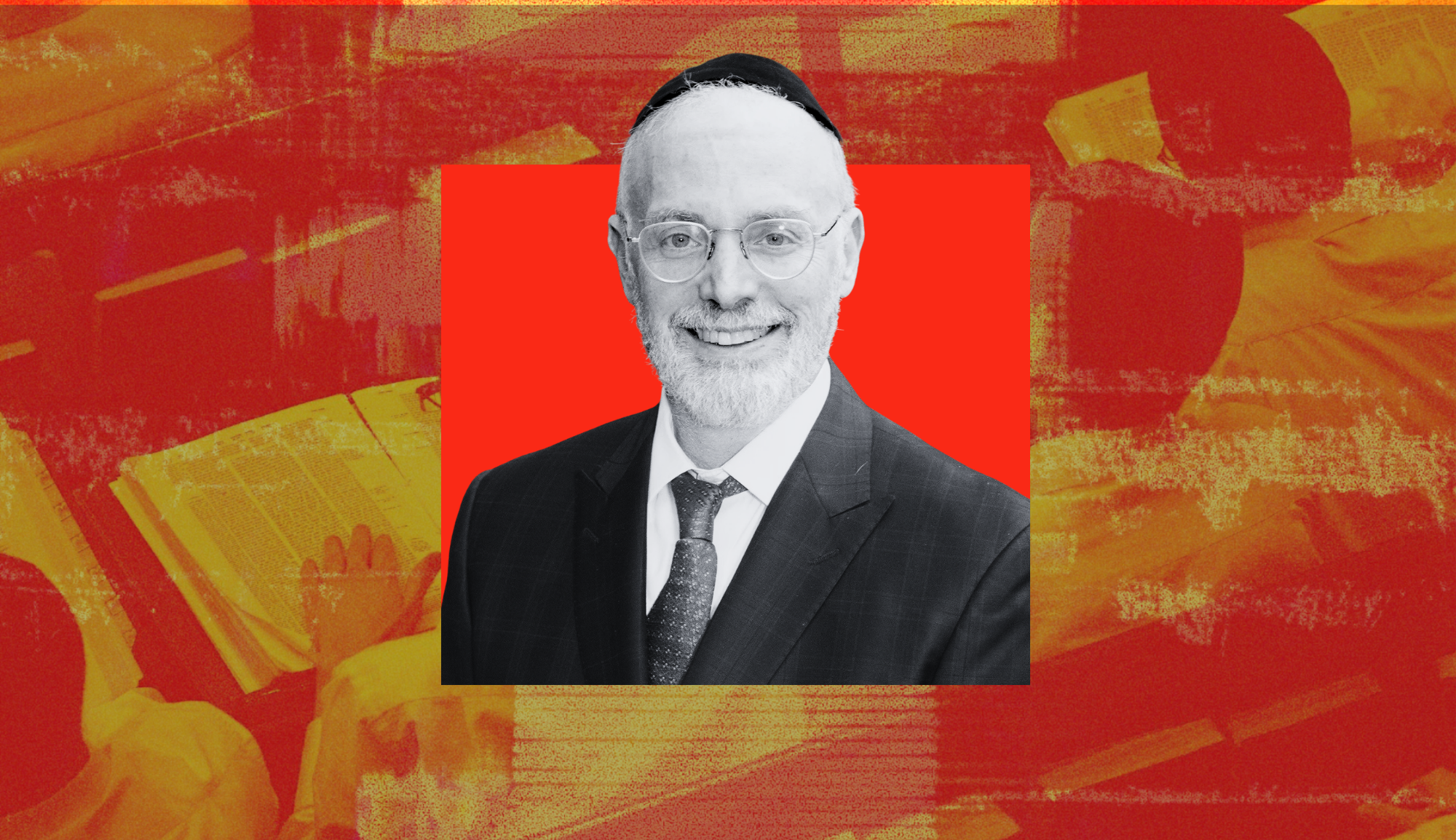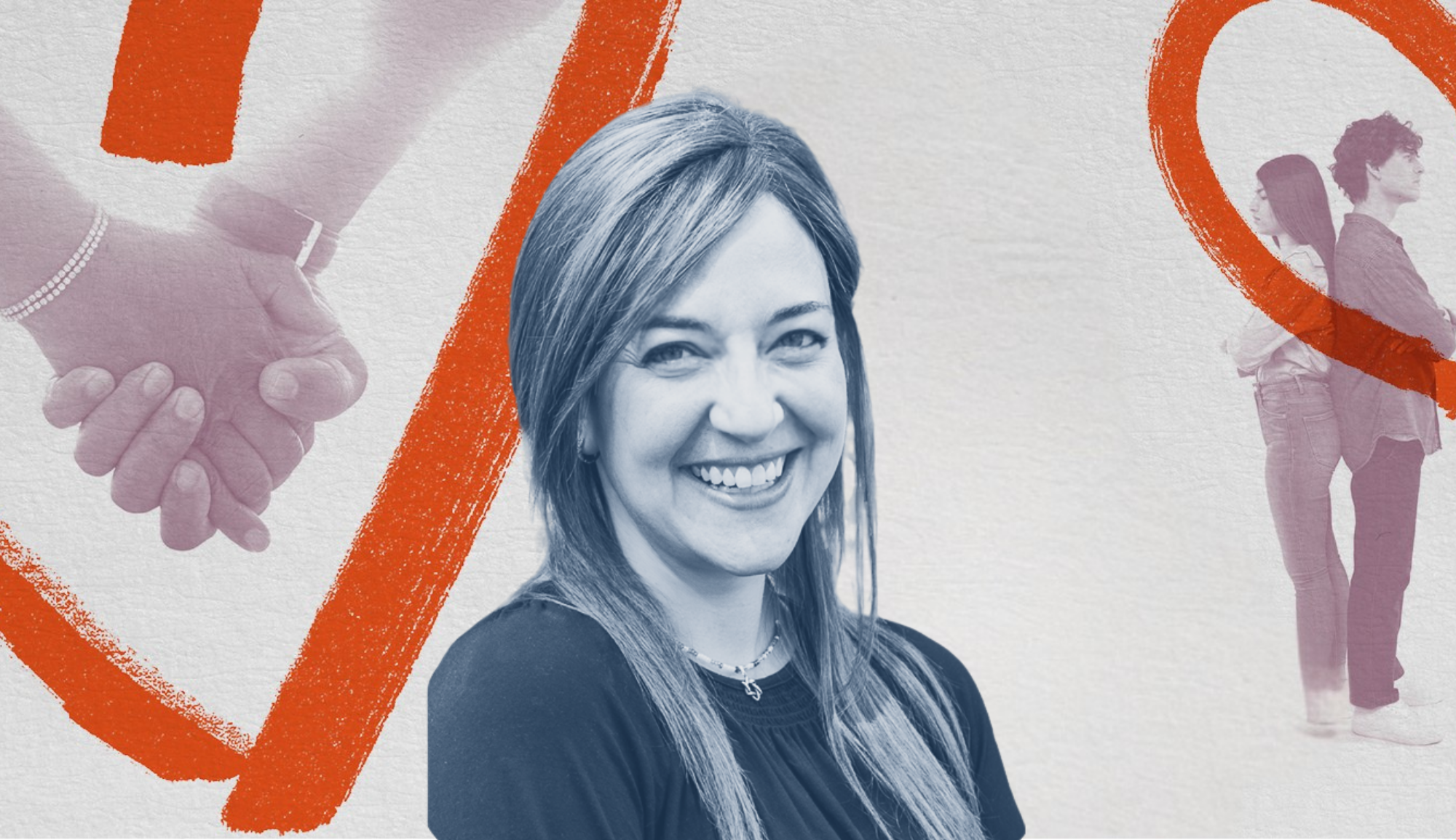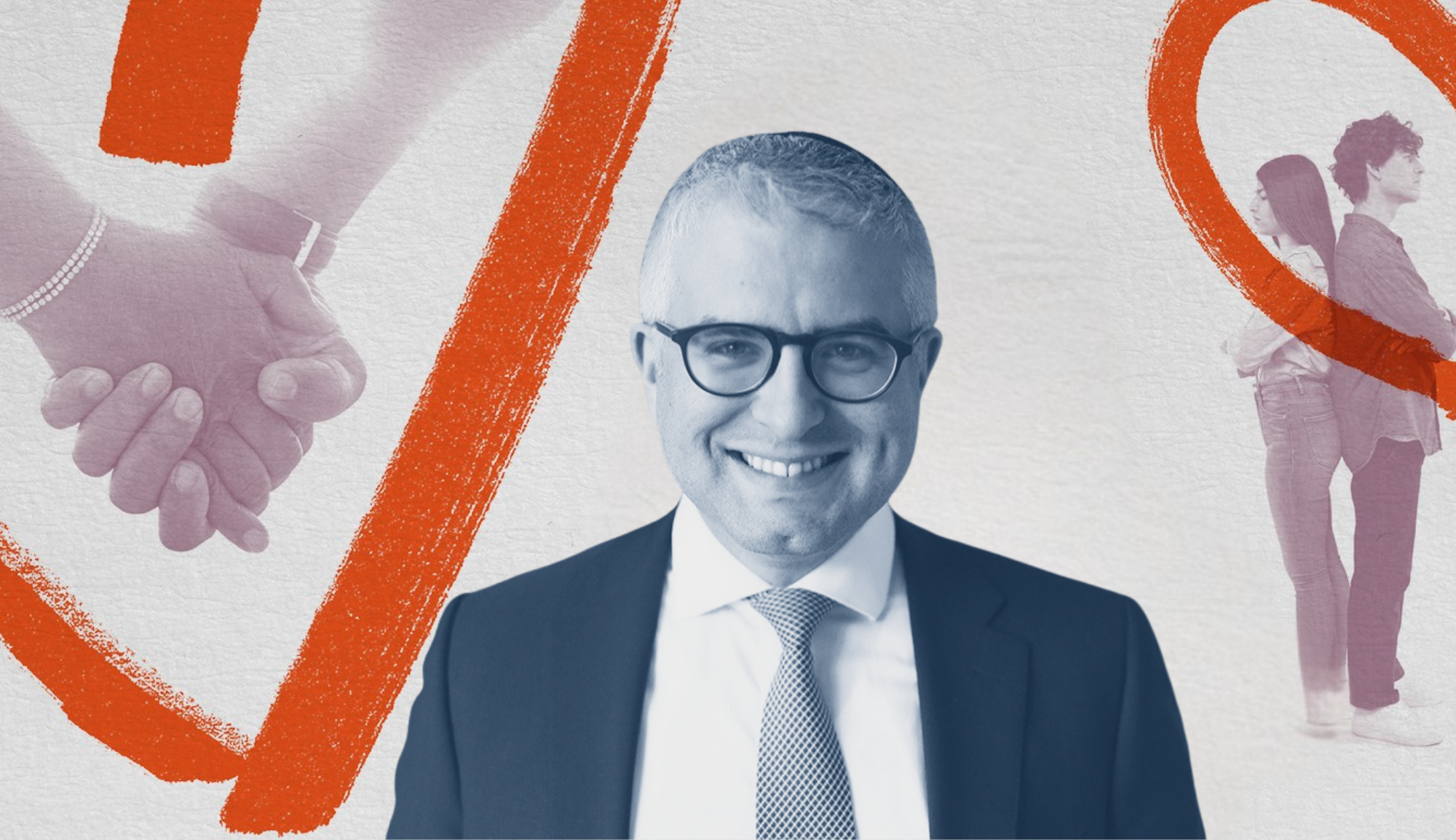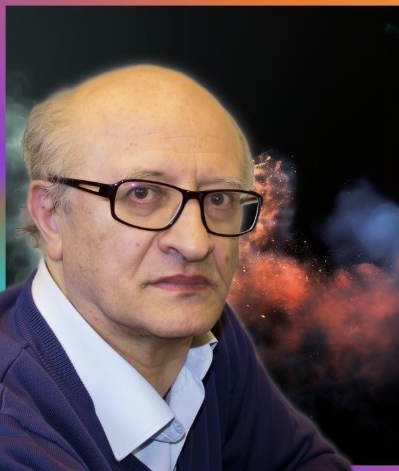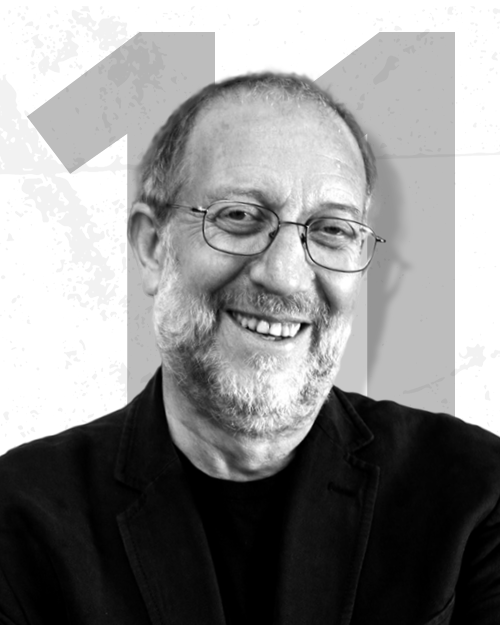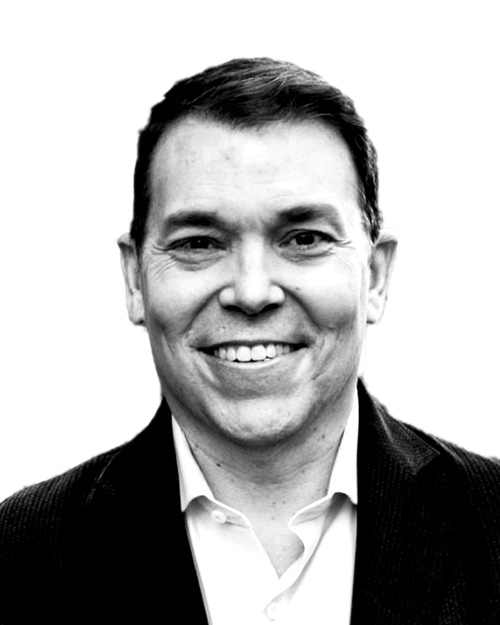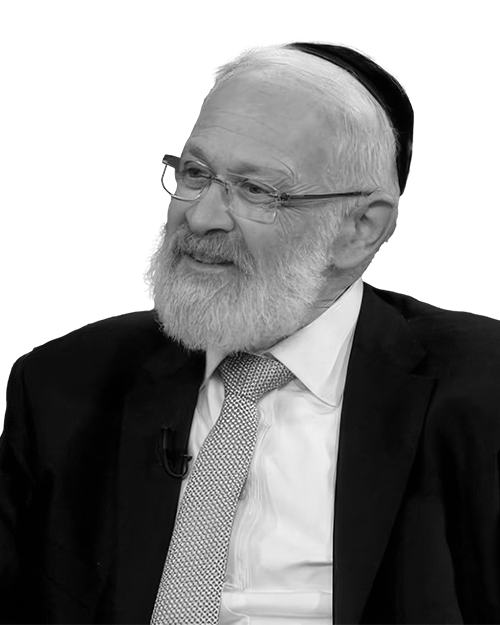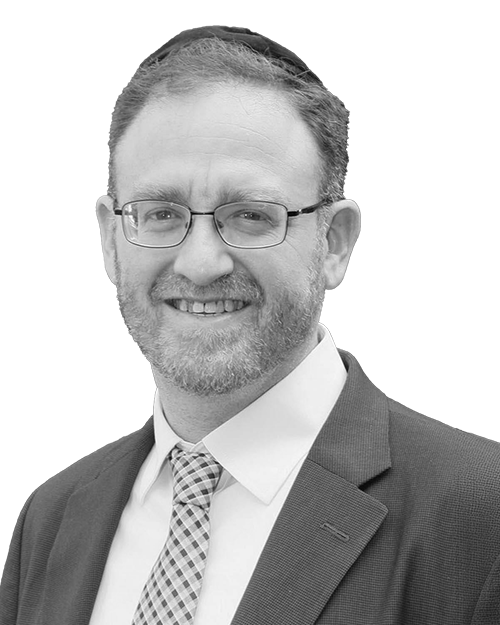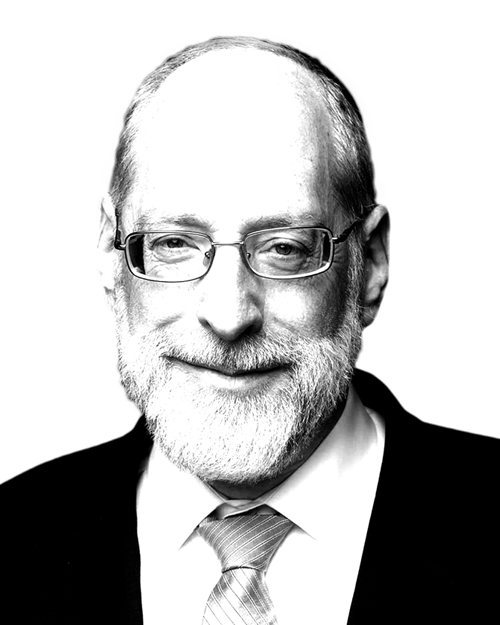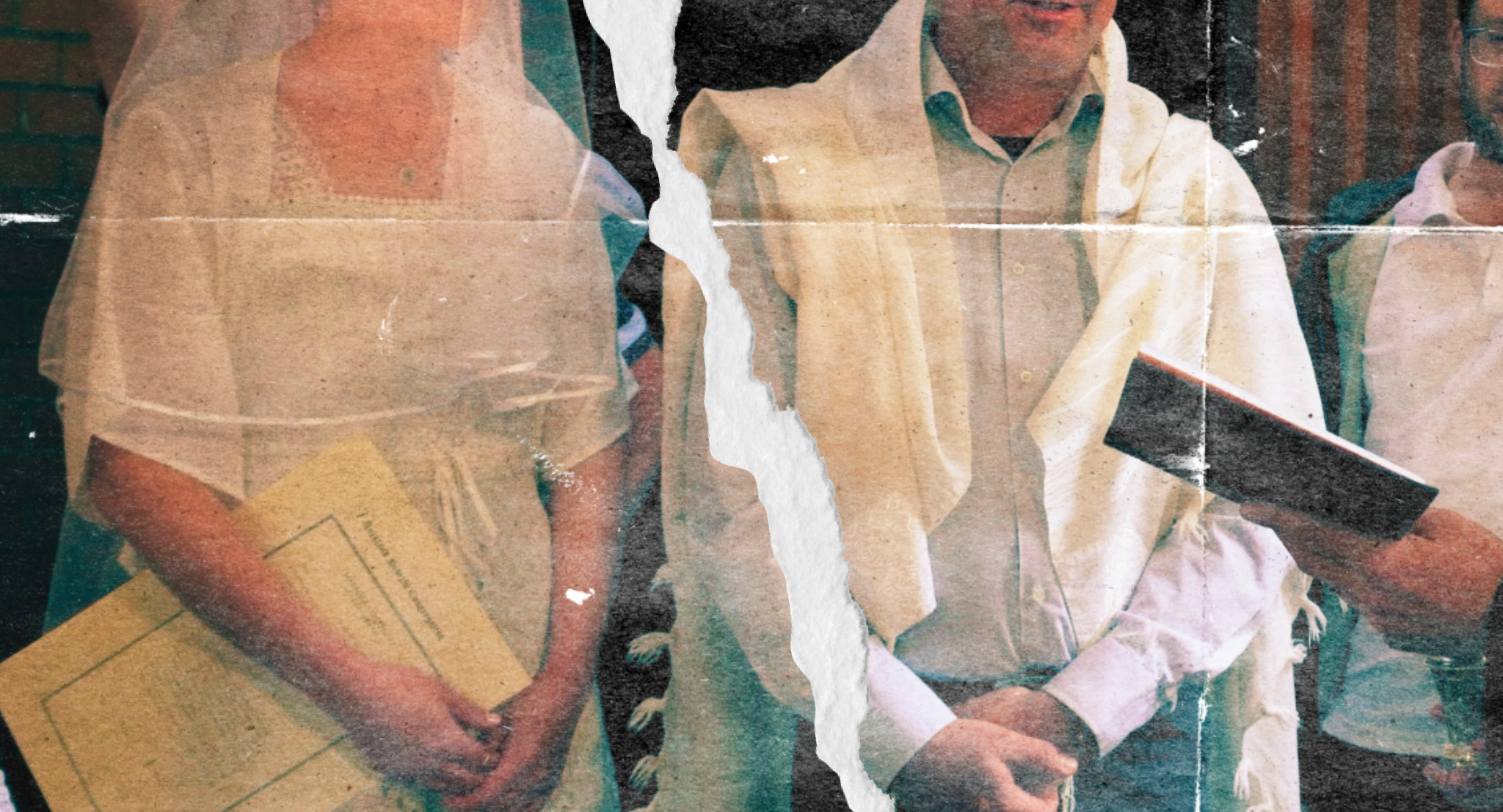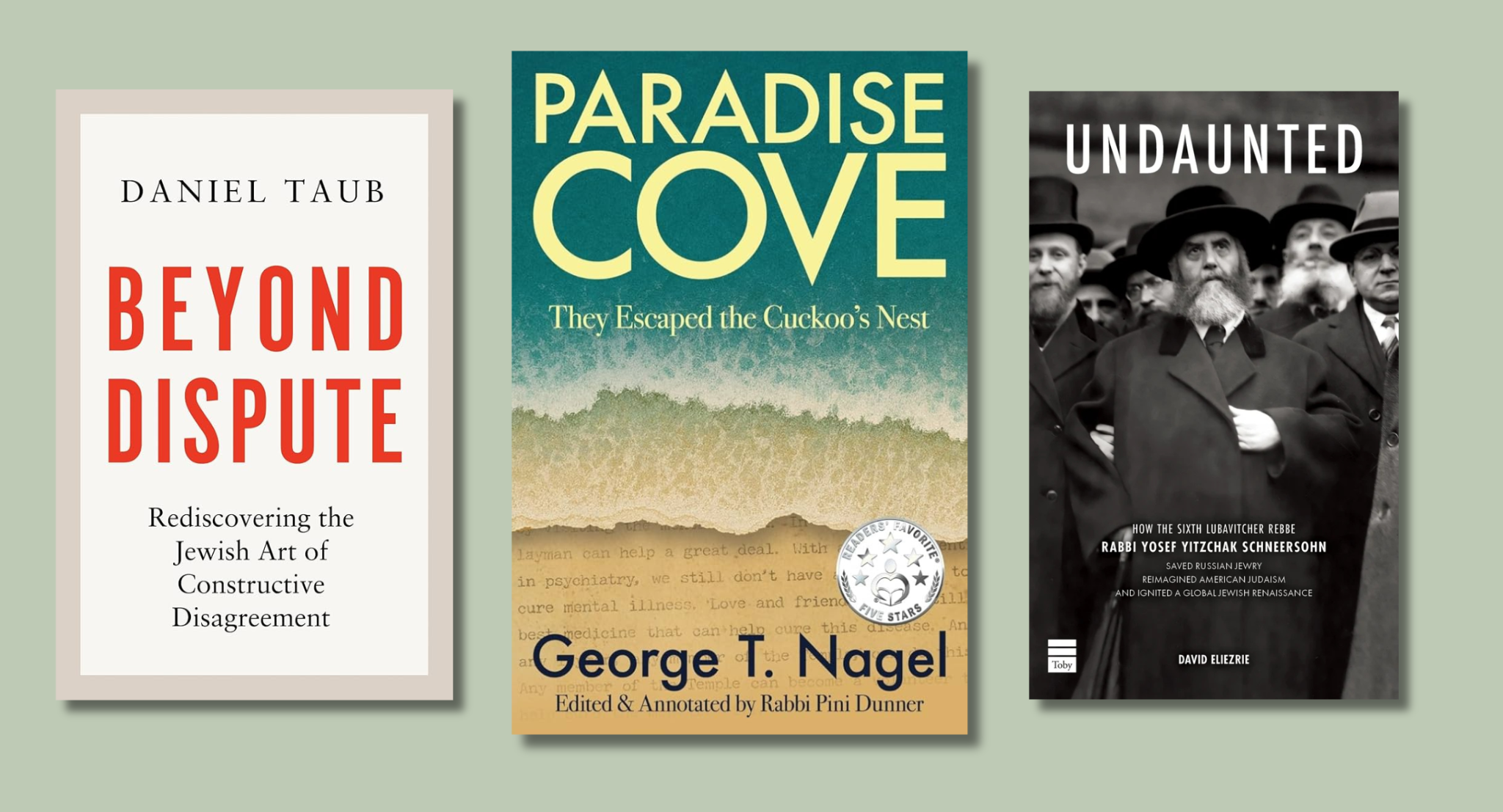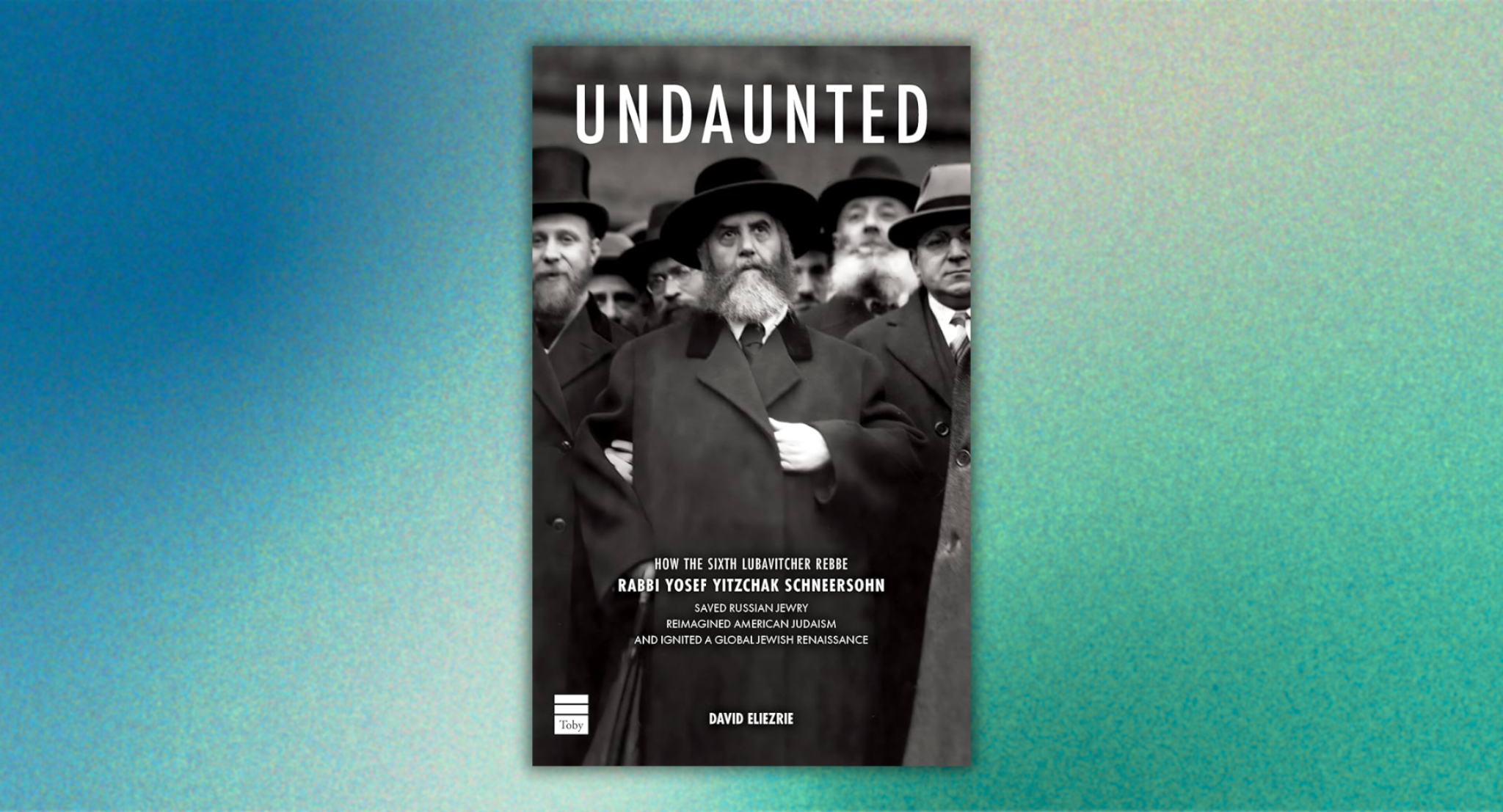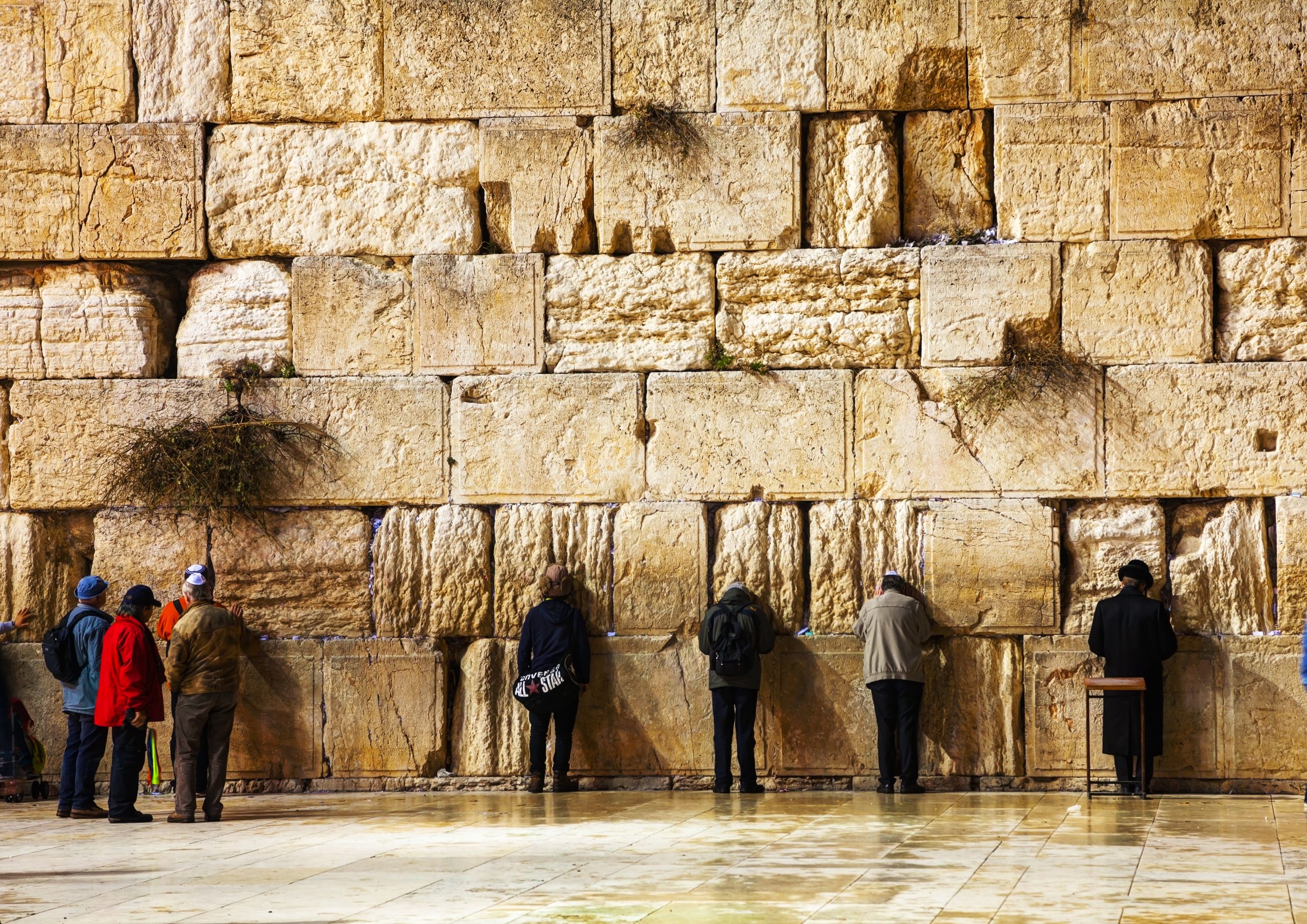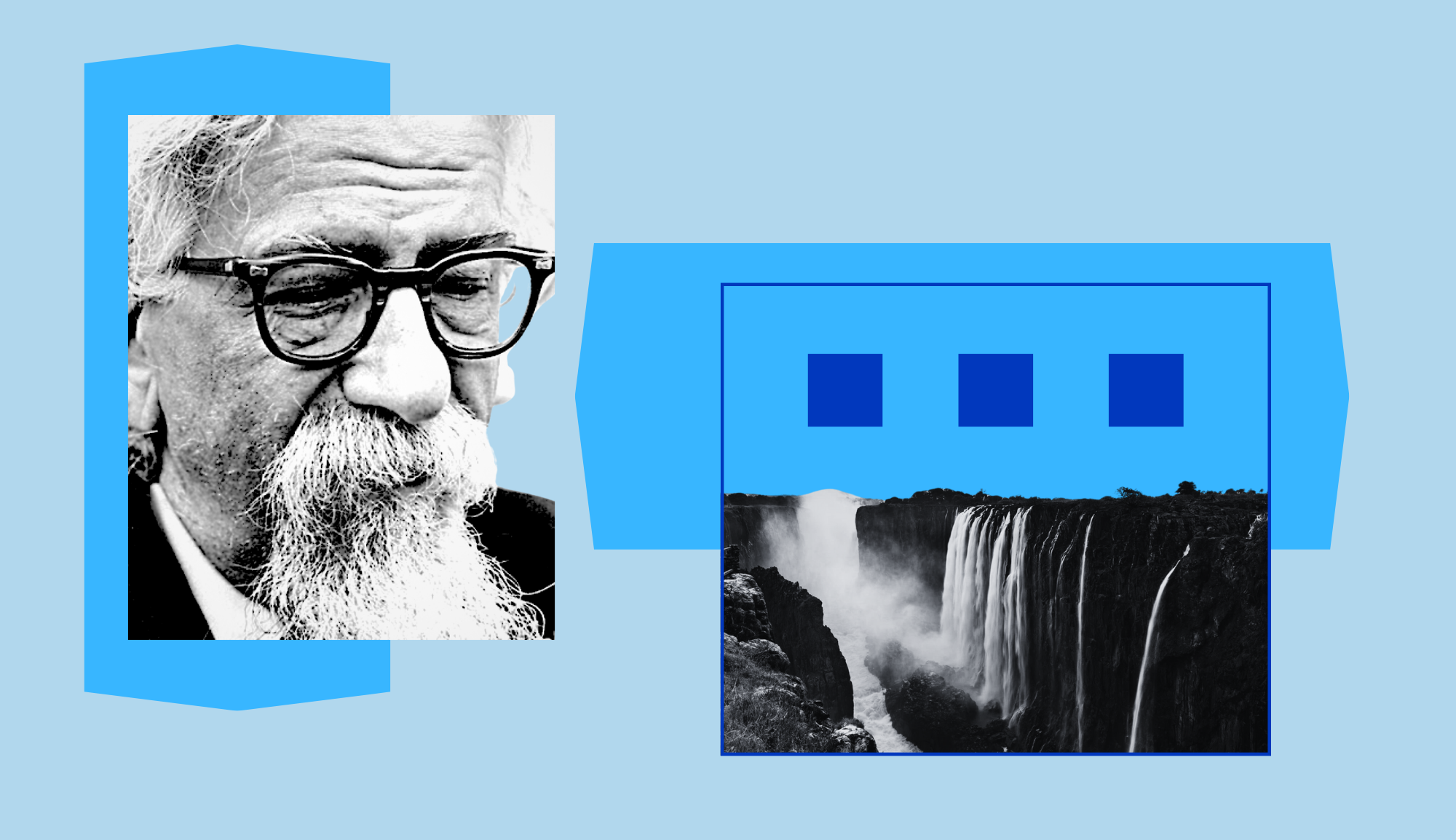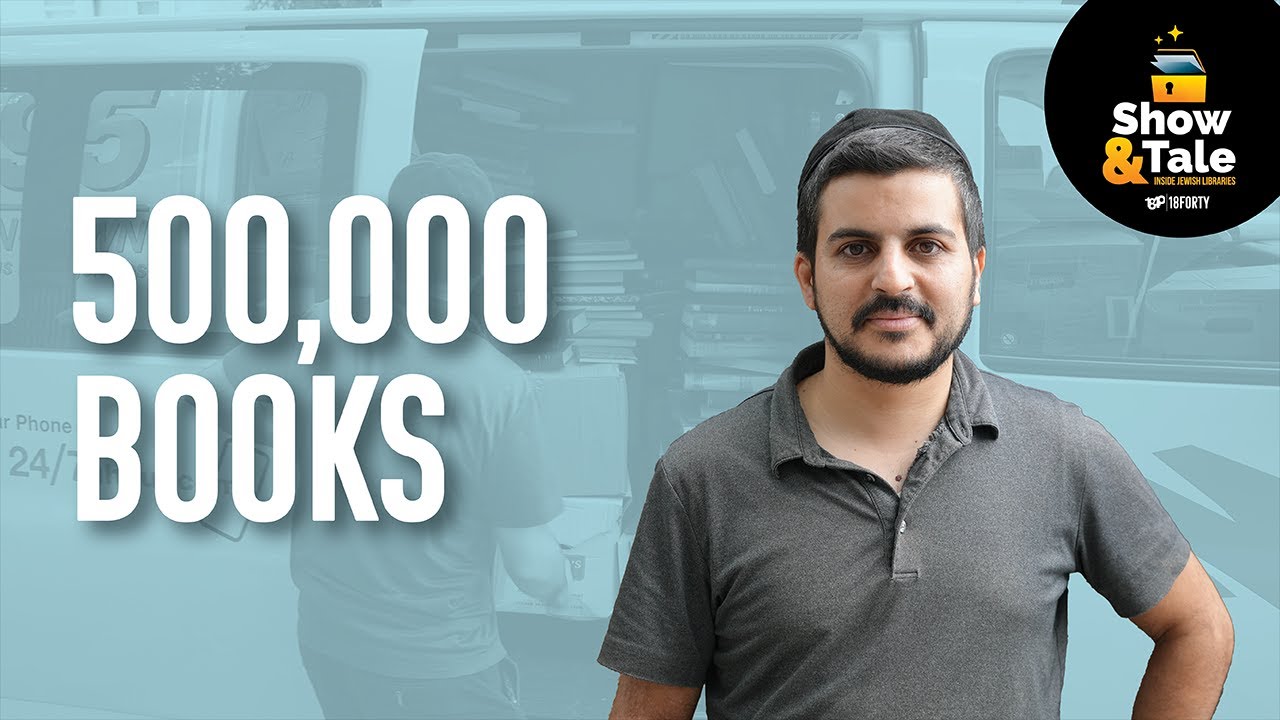Jonathan Rosenblum: Communal Boundaries and Cancel Culture
In this episode of the 18Forty Podcast, we talk to Jonathan Rosenblum – journalist and author of multiple ArtScroll biographies – about censorship and specifically how it applies to biographies.
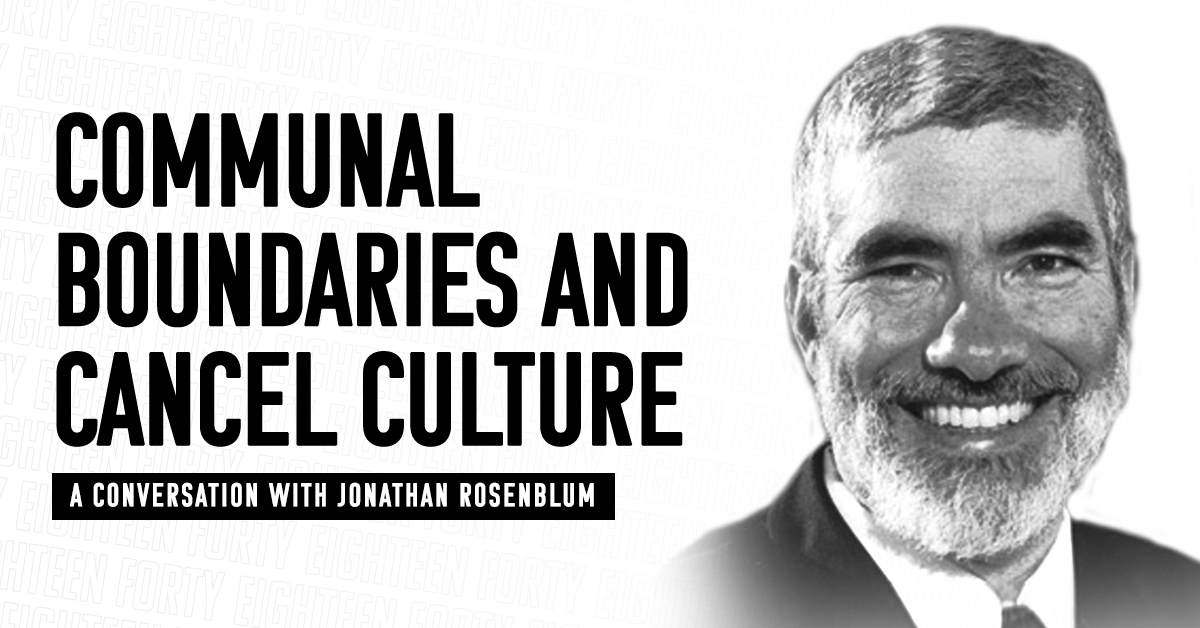
Summary
In this episode of the 18Forty Podcast, we talk to Jonathan Rosenblum – journalist and author of multiple ArtScroll biographies – about censorship and specifically how it applies to biographies.
One of the many areas in which censorship can be exercised is biography writing. Certain biographies of gedolim have been criticized for censoring their life stories to mask their imperfections, distorting history in the process. But censorship isn’t always about distorting the facts and may instead be about cultivating a certain look or feel.
- What is the goal of censoring the biographies of gedolim?
- What impact does it have?
- What are the intended effects of the biographies in the first place?
- What effects would the uncensored versions have?
Tune in to hear a conversation on biographical censorship.
References:
The Censor, the Editor, and the Text by Amnon Raz-Krakotzkin
Hidden Diaries and New Discoveries by Avinoʻam Rozenaḳ
Pachad Yitzchak: Igrot U’ketavim by Rav Yitzchok Hutner
Sin•a•gogue by David Bashevkin
They Called Him Mike by Jonathan Rosenblum
Between Berlin and Slobodka by Hillel Goldberg
For more, visit https://18forty.org/censorship/.
Jonathan Rosenblum is a journalist who writes for several Orthodox media publications, most notably through his weekly column in Mishpacha. Before entering journalism, Jonathan attended the University of Chicago, Yale Law School, and Ohr Somayach. Jonathan has written several biographies on Jewish figures, and was a founding writer of the Cross-Currents journal. Jonathan brings to 18Forty his commitment and dedication to the spheres of Jewish public opinion, politics, and religious culture.
David Bashevkin:
Hello and welcome to the 18Forty podcast, where each month we explore a different topic balancing modern sensibilities with traditional sensitivities to give you new approaches to timeless Jewish ideas. I’m your host, David Bashevkin, and this month we’re exploring censorship. That modern issue that keeps coming up, people crying “cancel culture.” We can’t share these ideas or this personality. We’re talking about censorship, specifically in the Jewish world. This podcast is part of a larger exploration of those big, juicy, Jewish ideas, so be sure to check out 18Forty.org where you can find videos, articles, and recommended readings.
There is an extraordinarily long history of censorship of Jewish ideas and Jewish books, and I think from the outset it’s important to make a distinction that there are two directions where the pressure to censor, or to so to speak cancel something, comes from. Most of Jewish history has involved censorship from the non-Jewish community: people who didn’t like the ideas in the Talmud, people who didn’t like rabbinic ideas. There is a very long history of outside censors coming into Jewish ideas and removing parts that they found objectionable. If I were to recommend one book on that topic it would definitely be Amnon Raz – I’m going to mess up this last name, you could send letters, Amnon Raz, don’t make fun of me – Amnon Raz-Krakotzkin, Krakotzkin, whose book I have, and I love, The Censor, the Editor, and the Text. It’s one of many books that discover and discuss the idea of an outside censor coming in, a non-Jewish censor, and censoring Jewish ideas.
This has taken place throughout Jewish history. An example that I always like to point out is the laws of conversion. If you look at the laws of conversion in a Shulchan Aruch, in an Aruch HaShulchan, in a compendium of Jewish law, you will find on top that says, these are laws that are no longer relevant today. Why do they have it there? You were able to convert the time that they were published. They were doing that primarily for the attention of the censor to make sure that the censor understood that they were not going to be converting anybody, because for most of Jewish history, conversion was illegal in European countries, and they didn’t want to get anybody in trouble.
These are examples of censorship from the outside, but that is not the only form of censorship that the Jewish community has experienced. We’ve also experienced censorship from the inside: people censoring from within their own yeshiva, their own teachers, censoring their own works. Jews, so to speak, censoring themselves. Self-censorship, in a way. Self can mean the author themselves, it can mean their students, it can mean the publisher, a Jewish publisher says this is not going to work.
There is a wonderful article from Avinoʻam Rozenaḳ, and I’m airballing every single last name, called Hidden Diaries and New Discoveries, which discusses the life and thought of Rav Kook, specifically how his writings came to life. And he actually makes a fascinating distinction in the way Jewish ideas were censored from the inside. He makes a distinction between practical suppression and defensive suppression. Practical suppression is when we censored ideas because they weren’t articulated properly. I would call that editing. This podcast is edited. I edit, you may not hear it. We’ll see what Deena, our incredible audio engineer, chooses to keep in at the end, but very often I will say things, I will record things, and it just does not come out well. Today is definitely one of those days. But you can record something, you can write something, you can publish something, and there can be practical suppression. This is an idea that was not expressed artfully, what some politicians might call misspeaking. It just wasn’t written the right way, maybe it was written better elsewhere, and it’ll be censored for that reason.
But what we’re really focusing on is defensive suppression, and that is when, whether it’s the author themselves or their students, will censor ideas because they are so easily misunderstood, they are not yet ready to be shared with the public. And two very contemporary examples of this, one, which is what the article is about, is in the writings of Rav Kook. Rav Kook’s famous student, known as the nazir, Rav David Cohen. Rav David Cohen censored the writings of his Rebbe, Rav Kook. How do we know this? Well, if you look carefully in certain passages, particularly there’s a fairly well-known passage in, I believe Oros HaKodesh, which is one of the books of Rav Kook.
You’ll see there are these little dots on top of the letter, and what are those dots signifying? Those dots are signifying, they’re not the nekudos, the vowelization, it’s just these random dots, and they are signifying the fact that part of the passage was censored. His students were concerned that the public reading Rav Kook’s writing, knowing the context of the way Rav Kook’s ideas had already been received and the controversy that they caused, he was concerned that we need to excise this passage. We need to take it out because he is going to be persecuted. He is going to be canceled by the public reading it. They are not yet ready to read these examples.
Another example of students censoring the words of their teacher is my teacher, who I’ve spent so much time studying, is Rav Tzadok HaKohen MiLublin, the great Hasidic leader from 1823 to 1900. And my dear friend, Josh Rosenfeld, who you might want to go out and Google this right now because it’s an absolutely wonderful article that he wrote on the history of the publication of his works. And he has this great table that literally tells you which passages were taken out, but you don’t even need him to do it. If you go and you open up the first Hasidic work of Rav Tzadok, you will find that they skip the numbers. Depending what edition they have they censor sometimes more, they censor sometimes a little bit less. But throughout that work there were passages that were taken out because they were worried that the public would not properly be able to digest or understand. They would look at this teacher, these great ideas, and it would be distracting, so to speak. They would end up misunderstanding it, and the ideas would not be able to have the impact as they should.
Now, for a lot of people hearing about this type of censorship, it can be unsettling. What does it mean that the ideas that we’re having that were deemed worthy by the author themselves have been, you know, whitewashed or expunged from the very works? But I think any act of publishing and any act of sharing has some element of censorship involved with it. And it’s a little bit what I think, and I’m going to push back on this, everybody may or may not agree with me, but I think the number one target that you see, certainly online, in academics, they’re sometimes very frustrated with the world of ArtScroll, which is what we’re going to be spending a great deal talking about today. They’re frustrated because in a lot of the history books and a lot of the biographies of ArtScroll, it seems that a lot of the gory details of these people’s lives can be whitewashed. We don’t hear that much about their struggles. We don’t hear that much about what went wrong in these people’s lives. And it’s a criticism that in many ways is absolutely fair.
The great Rav Yitzchok Hutner quite famously wrote in his 128th letter, which is undoubtedly his most famous letter, and if you’ve never read it, now is the time to find it. You can definitely find translations of it online. You can reach out to me, I’d be happy to share a translation with you. And he writes in his 128th letter that there is a problem with storytelling with biographies in the Jewish community. That we read these biographies and we hear about these rabbis, they were eight years old, they were geniuses, they were doing unbelievable things from a very young age, and it just seems like this very straight, sequential path that they took towards greatness.
And so much of the struggles, the example that Rav Hutner uses is the Chofetz Chaim. He says, “We just talk about the Chofetz Chaim as if he was born pristine, perfect, great, but who shares the stories of the struggles and the difficulties that the Chofetz Chaim, this personality, Rav Yisrael Meir Kagan, had to go through to achieve the saintliness that he is now renowned for? And I think that this is absolutely a remarkable point. I write about it in the introduction to my work, Sin-a-gogue, spelled S-I-N for those who don’t know, Sin-a-gogue: Sin and Failure in Jewish Thought. And I think Rav Hutner is talking about something specific in the life of the Chofetz Chaim, that we know later on that the Chofetz Chaim did struggle, had depressive episodes that, you know, it’s certainly not written in his standard biography.
And Rav Hutner, who overlapped in the life of the Chofetz Chaim, I don’t know whether or not they met. I don’t think that they did, but I could be absolutely wrong on that. But Rav Hutner was pointing out the fact that we tell these pristine stories that can sometimes whitewash, censor, or almost cancel, the very figures and values that were once acceptable, that were initially meant to be transmitted.
However, with that being said, I do think that ArtScroll is unfairly identified in this. I happen to be very close friends, I work a great deal with ArtScroll, so I can disclose that. I didn’t publish my books with ArtScroll, though one of them I tried, and I got a big, fat, juicy no thank you. Said with love, of course, always said with love. But I work all the time with ArtScroll, and I happen to think that they are unfairly positioned as this target because you need to understand what it is in fact that they are trying to do.
A lot of that we’re going to discuss in this conversation with Jonathan Rosenblum, who has published several incredible biographies with ArtScroll, who’s going to talk a little bit about his process, what he puts in, what he takes out, and some of his larger views on censorship and cancel culture. But specifically with ArtScroll, I want to say two things on the record. And I think the first thing has to do with, not every story needs to be told to everyone. I think that this has to do with the familial component of Judaism, and the familial relationships, so to speak, that we almost develop with previous generations. And the analogy that I often like to give is, what stories do you tell and share about your parents’ marriage?
Undoubtedly, every marriage is rocky. I am married, it’s not falling apart, but every marriage has fights, has difficulties, has difficult times. But I don’t agree that we need to sit down our children at a young age and talk about, you know, the difficulties that mommy and daddy had in their initial time, whether it was they were dating, or their first year married, or later on, bickering, or recurring issues that they may have had. I don’t think parents need to sit down their children and air out every grievance that they’ve ever had. I think that when we initially share children those stories, we want them to have faith and trust in the context and in the marriage that brought them into the world. And I think in some ways there is a space to tell such stories.
I don’t confuse those stories with history, but I also don’t think that those stories are anti-history or uproot history. I think those stories serve a very important purpose, and I think in many ways, this is the purpose of ArtScroll biographies. It’s those stories that allow us to tell the story of previous generations, their marriages, so to speak, their commitment to the Jewish people, so to speak, which may have absolutely had dark spots and rough spots. But there is a space for certain ages, for certain demographics, that we tell more pristine stories.
Now, that doesn’t mean that we need to expunge the historical record. And actually, my mindset and relationship with ArtScroll biographies, I’ve read all of them and enjoyed nearly all of them, but the one that I love the most, that I think really gives you an insight to what they are trying to do, what this Orthodox publishing house is trying to do, is the biography of the founder of ArtScroll, Rabbi Meir Zlotowitz. I think of any story that I’ve read in any biography ever published by ArtScroll, which are sometimes labeled hagiography, and so long as it’s not meant derisively, I don’t think that’s a bad thing. But in the biography of the founder of ArtScroll, it gives you an insight. It almost undermines the very analogy that I said. And that is that there is a story that they share that most people don’t know or aren’t familiar with, that the founder of ArtScroll, Rabbi Meir Zlotowitz, was divorced. His marriage fell apart. It doesn’t give all of the details, and I think rightfully so.
But there’s this incredibly moving story that right after the divorce, he came back extraordinarily depressed and tried to reach out to his Rebbe, Rav Moshe Feinstein. And when he came to Rav Moshe Feinstein to tell him what was going on in his life, Rav Moshe was crowded around by his students, and he couldn’t break through and talk to Rav Moshe. So he went home and started getting his kids to bed. It was a snowy day, it was in the winter, and as he’s getting his kids ready he heard a knock on the door, and it was Rav Moshe Feinstein. And I’ll read directly from the biography. “The rosh yeshiva, posek, the decider of religious law of his generation and leader of thousands accompanied his student up several flights of stairs, coming into the apartment and taking in the scene. Rav Moshe lifted one child, then the next, and finally the third one. He tucked each one into bed, telling them a story and kissing them goodnight. Then, when the house was settled, Rav Moshe looked at Rav Meir Zlotowitz, the founder, and said, ‘I came to schmooze to hear what’s on your mind.’”
And I read this story and I said, “I want this story in my life.” It’s a story that does tell you some of the friction that was going in Rav Meir Zlotowitz’s life, but that’s not what it dwells on. It dwells on something else. It dwells on something that is incredibly inspiring. And the moment I read this story about the very founder of ArtScroll, I reoriented my feelings of ArtScroll biographies. I think that they do uplift. It’s important not to confuse them necessarily, they’re not PhDs necessarily. Some maybe could be, but not all of them are, and that’s okay.
And if you read them without that cynicism, without, you know, expecting one thing and getting another, but knowing exactly what they are and exactly what they’re meant to accomplish, then it’s not an act of censorship in the malicious sense, but an act of self-censorship of sharing the areas and values that they are trying to reinforce and uplift. It is not trying to correct the historical record. And some of this we’re going to share and discuss with Rabbi Jonathan Rosenblum, who, the entire interview I was so taken aback because he looks just like my father. In fact, if my father and Rav Hershel Schachter had a child together it would look exactly like Jonathan Rosenblum. An analogy that I think none of our listeners will appreciate or care for, and I cannot blame you, but it was on my mind the entire time.
So when we think about censorship, we need to think about what we self-censor, what don’t we include from our own stories. In what contexts, what demographics, what ages do we tell which stories? And that’s very much a part of our conversation today with Jonathan Rosenblum. I am very excited to be sitting here with Jonathan Rosenblum. Somebody who I am excited, I usually call all of my guests friends, but over here, it’s closer to my father because you look so similar to my father. It’s really a spitting image.
Jonathan Rosenblum:
Oh, come on, your father wasn’t that good-looking. Come on.
David Bashevkin:
But it’s really, really a pleasure to be sitting together with you today. The reason why I am so excited to speak with you is, aside from being an extremely prolific author, specifically in op-eds in the Jerusalem Post for decades, you’re also one of the great biographers of the Jewish community. You have written biographies on Rav Yaakov Kamenetsky, on Lieutenant Birnbaum in a biography called They Called Him Mike, which you wrote with his family, I believe.
Jonathan Rosenblum:
No.
David Bashevkin:
No?
Jonathan Rosenblum:
No. Lietenant Birnbaum was done together with him based on tapes that he did.
David Bashevkin:
With him? Okay.
Jonathan Rosenblum:
Rav Dessler I did myself.
David Bashevkin:
Rav Dessler you did yourself. And the great Rav Shraga Feivel Mendlowitz.
Jonathan Rosenblum:
Right.
David Bashevkin:
Who was the rebbe of my grandfather. So this feels very familial. And the reason why I wanted to talk about biographies and jump in is because biographies – I love your biographies. My father, as I mentioned, is quoted in a footnote in one. Maybe even in the very text, he’s definitely in the index of the Reb Sherer biography. He was his doctor at the very end of his life and helped make some of those decisions at the very end. I grew up hearing his name. But very often, biographies, even though they are beloved, do get criticized sometimes, something you’ve written about, that criticism. They get criticized, a similar criticism by two different populations.
One population are people who are kind outside or peripheral to the Orthodox world, who feel that the history presented in biographies is not accurate enough. You hear, you know, they were geniuses when they were eight years old and they were destined for greatness and for leadership, and it just seems, for the average person it could be dispiriting, and it can whitewash a lot of the real messiness of these people’s lives. And the same criticism has been levied not by people peripheral to this world, but from the center of this world. The one person who does not have a great biography is Rav Yitzchok Hutner, the great rosh yeshiva of Chaim Berlin. It appears in some places. There’s no ArtScroll biography on him, and maybe you could have a little bit of insight for why –
Jonathan Rosenblum:
That’s easy. That’s easy to explain why there’s no biography of Rav Yitzchok Hutner.
David Bashevkin:
Tell me.
Jonathan Rosenblum:
No one can deal with his daughter and son-in-law. I mean, it’s just… The family did not want a biography. I think the rebbetzin, the rebbetzin who is an academically trained historian, if I’m not mistaken –
David Bashevkin:
Sure. She wrote her PhD in Columbia on The Maharatz Chajes –
Jonathan Rosenblum:
Okay, so fine. The rebbetzin had – No one would get the permission of the family to do it. It’s as simple as that. And they would make it unpleasant for anyone who tried to go ahead and do it without the permission of the family. The older talmidim, meaning the ones who knew Rav Hutner best, would not feel comfortable. Hillel Goldberg did write –
David Bashevkin:
Correct, Between Berlin and Slabodka.
Jonathan Rosenblum:
Not a full length biography, but it’s certainly, I would guess 50 to 60 pages.
David Bashevkin:
Yeah, it’s phenomenal. It’s phenomenal. And I recommend that except it costs $300 because it’s out of print. I think they just republished it, but it costs a fortune. It costs a fortune and it’s funny, you should know, somebody just asked me, I was being interviewed and he said, “Who is your dream guest on the podcast?” And I said, Rav Hutner’s daughter, Rebbetzin Bruria David Hutner. She’s number one on my list.
Jonathan Rosenblum:
See I have a son who learned for 13 years by Rav Yonason.
David Bashevkin:
That’s Rav Hutner’s son-in-law.
Jonathan Rosenblum:
Yeah, Rav Yonason David. And yes, the rebbetzin… I’ll give you an example. The rebbetzin is certainly very far reaching. One time I was debating Efraim Zuroff on his book on the Vaad Ha-Hatzala and so forth. It was a very hot room, it was mobbed. This was like, in the haredi intellectual circles, or frum intellectual circles, this was like Muhammad Ali and George Foreman. Not that it was much of a debate, I destroyed him. But okay, we’ll live.
David Bashevkin:
Okay.
Jonathan Rosenblum:
But when I got there the rebbetzin was there waiting to get in. I said, oh, I’m so glad that my oldest son, who was learning in her husband’s yeshiva, didn’t come with me. I wouldn’t have wanted him to get in trouble when the rebbetzin showed up. She’s definitely a very inquisitive, deep, broad-minded person. I could fully understand why she might be well be your… But I don’t think she’d be an easy interview.
David Bashevkin:
No. No, not at all. Not at all. Not as pleasant as you.
Jonathan Rosenblum:
Definitely not, because she has too much to protect and too much at stake, and I don’t… I have no yichus, I have no name, and I can talk as freely as I want.
David Bashevkin:
So that’s a great place to start. You have nothing to protect. Here’s what I want to ask you about first the process of writing a biography. When you write a biography, and you’ve published nearly all of them, you have a new biography coming out about Rav Noach Weinberg, the founder of Aish –
Jonathan Rosenblum:
Yeah, that’s out already. That’s already out.
David Bashevkin:
That’s out, and we can talk about that.
Jonathan Rosenblum:
Gotta read that.
David Bashevkin:
Tell me a little bit about the process of a biography, and what is your goal in writing a biography?
Jonathan Rosenblum:
Okay, those are two separate questions. The process is, since I’m a procrastinator I like to interview people. I mean, interviewing the… Through writing biographies I’ve had access to so many people of a stature which I never would have had any opportunity to meet if I hadn’t been writing these biographies. So, you know, that’s always a pleasure. I mean, some of them have been different because, let’s say in the Reb Yaakov book –
David Bashevkin:
That’s about Rav Yaakov Kamenetsky.
Jonathan Rosenblum:
Right. Rav Nosson Kamenetsky had done a lot of interviewing, and he gave me his interviews, many of which were at least partly in Yiddish, which I do not speak, so I had to get somebody to translate the Yiddish parts of those for me. But, you know, I had a lot of material already gathered. I prefer to do the gathering of the material myself.
David Bashevkin:
Well, before you gather materials, how do you decide who to write a biography on?
Jonathan Rosenblum:
That’s easy. Somebody comes to me and says, “Will you write a biography about so and so? This is how much we’ll pay you.” That’s very easy. No one starts… You know, the first book was… I was very lucky. The first biography was Reb Yaakov, and at that time I think Rabbi Shimon Finkelman was writing most of the biographies, and he wasn’t available, and ArtScroll was sort of up a creek. And when I met Nosson Scherman through Yated Neeman, which I was editing at the time, and they asked, they came to me. Now, this will lead me to the second question, by the way. The second question is, what are you trying to do in a biography?
David Bashevkin:
Yes.
Jonathan Rosenblum:
So I have an introduction to the Reb Yaakov book. It’s interesting because I went back to look at it, I started giving speeches on gadol biographies, what goes in and what doesn’t go in, and so forth.
David Bashevkin:
I’m just going to do the translation once: a “gadol” meaning a great leader of the Jewish community.
Jonathan Rosenblum:
Right, right. So in the Reb Yaakov book, and I looked back, and I wrote an introduction addressing the question of what this book should be, what it should be about, and it really stands up for everything I’ve written. The purpose of a biography is to show what was unique about that particular figure. So the idea of falling into a hagiographic mode where it’s like the lives of the saints, where at five he was this, at five he knew all of Tanakh, at 10 he knew all of this, at 13 he married the daughter of the richest man in the world, and so forth, that was never a temptation for me, because I wasn’t trying to fit anybody into a model. For instance, I say at the beginning of the Reb Yaakov book, the psakim –
David Bashevkin:
Halakhic rulings.
Jonathan Rosenblum:
Halakhic rulings that Reb Yaakov gave are not quoted here because they’re meant to be definitive. It’s enough that a figure of his stature said them. I’m not trying to do more than that. I’m not trying to tell anybody how they should live their lives or what is a proper psak for them. My feeling is if somebody’s worth writing a biography about, it means he’s worth presenting kemo shehu, as he was.
I mean, one of the most beautiful treasure troves of information that I wrote about Rav Dessler is that I have dozens and dozens of letters that he wrote during the period of time when he was founding The Gateshead Kollel, of which he was the initiator. Or if not the initiator, he was the first head of that kollel. But most of his time was spent traveling all around England on trains at night, both to raise some money and to meet with former students of his. And he wrote a lot of letters back to Rav Zusha Waltner, the members of the kollel, to Rav Solomon Sassoon, who was his chief talmid, his chief student. He was later asked to become the Sephardi Chief Rabbi of Israel
In other words, I had a lot of letters. You could see the person, the person came through as he was through these letters. So, sometimes you find things that… You know, in some ways my favorite chapters in the Mike Tress book, it’s a group of letters that I discovered in a file cabinet of soldiers who had written back to the Agudah during the war. They would get Pesach supplies, they would get some things from the Agudah. They would get Orthodox Youth, which was a magazine that was put out. And when they were in the DP camps, a lot of Jewish soldiers, Orthodox Jewish soldiers, wrote letters to Mike describing what it was like in the DP camps after the war, and what the situation was, and how the American soldiers even after the war were often times favoring German girls and, you know, all kinds of things that you wouldn’t have believed even after the war. That it wasn’t so easy for the Jews in the DP camps and everybody wasn’t always running out of their way to help them.
David Bashevkin:
So how would you respond to somebody, you know, there’s this genre called the ArtScroll biography. And you’re really at the center of it. And it’s gotten a fair amount of criticism as whitewashing the real history as it’s happened of the lives of these figures. So it’s a two part question, and you can respond. Meaning, number one, did you do any whitewashing, and why? And secondly, how would you respond to that accusation?
Jonathan Rosenblum:
Okay. Let me just tell you, there are very few things that really make me angry.
David Bashevkin:
Is this one?
Jonathan Rosenblum:
But one of the things that does make me angry, a good friend of mine once wrote in an article of his in the Jewish Observer, he referred to the ArtScroll biography of Rav Shraga Feivel Mendlowitz. And I called him up. I got his –
David Bashevkin:
He referred to it negatively? Critically?
Jonathan Rosenblum:
No, no, no. He just referred to something that the ArtScroll biography of Rav Shraga Feivel Mendlowitz –
David Bashevkin:
Uh-huh.
Jonathan Rosenblum:
I called him up. He didn’t answer, I got his answering machine. I told him that my publishers do not write biographies. Authors write biographies. It is not the ArtScroll biography of Rav Shraga Feivel Mendlowitz, it’s Yonason Rosenblum’s biography of Rav Shraga Feivel Mendlowitz. Don’t do that again. It’s one of the things that drives me bonkers.
David Bashevkin:
That’s very fair. Meaning, instead of talking about the genre, if you have an issue then take it up with the author.
Jonathan Rosenblum:
Yeah.
David Bashevkin:
And not talking about it as if there’s this monolithic genre called the ArtScroll biography.
Jonathan Rosenblum:
I mean this is a little bit gayvadig, but I don’t think that this criticism has ever… I think when Rav Yaakov appeared on the scene, this is what I was told, that it sort of broke the mold. That it was different. I’m an academically trained historian too, you should know. I mean, I started a graduate program at Yale when I was in law school, in history, I was a history major. In college, I wrote lots of long, long papers, and that… I mean, I don’t have PhD. I mean, I have a Masters in history, but I have an academic background, so I have some concept of standards of historicity that, you know, I… I’m a little bit careful about this.
Now I will tell you, that doesn’t mean that everything always goes in because first of all, it doesn’t necessarily go in because you have a publisher and they may take things out. They rarely put things in, but they may take things out. I, frankly, cannot remember that much that has gone out of a book that I really missed tremendously. I can tell you that –
David Bashevkin:
Anything that you’d feel comfortable saying that was taken out?
Jonathan Rosenblum:
A story I tried to get in three times. The story of Rav Eliezer Gordon was giving a shiur in Kovno. And the two great yeshivas, Rav Boruch Ber’s yeshiva, which I think was called Beis Yitzchak, and another one was called, and the author’s yeshiva was, I think it was called Beis Yisrael, I don’t know which. They both all went to hear Rav Eliezer Gordon’s shiur. They crossed the river from Slabodka into Kovno, which was just across a bridge, and he started giving shiur. And as soon as… [inaudible], Rav Aharon Kotler, who was, you know, the star of the Slabodka yeshiva, asked him kasha, and he called him a shegetz. He started yelling at him, “Shegetz! Shegetz! Shegetz!”
David Bashevkin:
That’s a derogatory term for somebody who’s not so religious.
Jonathan Rosenblum:
Okay. That’s not… You’re not going to get the joke if you say it like that. It means a non-Jew, okay. It means a non-Jew.
David Bashevkin:
Keep going, keep going.
Jonathan Rosenblum:
Okay. So then Reb Shlomo Heiman, who was the star of the other beis midrash, also asked a question, and Rav Eliezer Gordon started yelling at him, “Turk! Turk! Turk!” And so, on the way back it was known that according to how difficult the question was, that’s how big the insult that Rav Eliezer Gordon would give to the person while he tried to work out an answer to the question. So the two yeshivas were arguing back and forth who had gotten the worse insult, the one who was called a shegetz or the one who was called a Turk.
David Bashevkin:
A Turk.
Jonathan Rosenblum:
And they decided that Rav Shlomo Heiman had been insulted worse because a Turk is also a shegetz. It includes more, the shegetz plus.
David Bashevkin:
The double. It’s worse.
Jonathan Rosenblum:
Yeah. So it was a double insult. He was a shegetz plus, a shegetz and also a Turk. So that’s a story that I wrote up. And Nosson Scherman wrote, “This story will not be understood,” and took it out. I think he was right, right?
David Bashevkin:
Yeah, he was probably right on that.
Jonathan Rosenblum:
You’re embarrassed for me to tell the story to you. You’re probably going to cut it out of the interview yourself.
David Bashevkin:
No, no, no, we’re not going to cut it. No censorship of the censorship episode.
Jonathan Rosenblum:
I tried to sneak it past Rav Nosson in another book, because the story wasn’t so germane and certainly not to Reb Yaakov. It was just funny to me because I realized that he should have said to all Lithuanians, my rosh yeshiva’s father had learned in Slabodka. The good talmidim they would insult sharply. They would never insult a weak talmid, but if a good one asked a tough question, they would insult him. It was a compliment.
David Bashevkin:
You worked closely obviously with Rav Nosson Kamenetsky because you did so many of his notes.
Jonathan Rosenblum:
Actually, not.
David Bashevkin:
No? You didn’t work so closely with him?
Jonathan Rosenblum:
No, he read over the manuscript when it was done. We were friendly, I may have asked him questions about things I didn’t understand. We were friendly, but I wouldn’t say we worked closely, no.
David Bashevkin:
Were you surprised to the reaction when his biography, which is nearly unreadable, Making of a Godol, two-volumes, came out and got such push back from within the community? Did that take you by surprise?
Jonathan Rosenblum:
Well, you know, I don’t… To this day, I got the first copy off the press. Rav Nosson came to my house and he brought me the first copy off the press. And, frankly, you said it’s almost unreadable, and I found it unreadable.
David Bashevkin:
Not almost.
Jonathan Rosenblum:
I was once asked by a rabbi at Ohr Somayach, how do we keep our students from reading this? And I said, “Let them try.” I said, “Why should you worry about it? Let them try.”
David Bashevkin:
Exactly.
Jonathan Rosenblum:
So, to this day, honestly, honestly, I don’t know why the book inspired such controversy. I think it only got Reb Yaakov up to the threshold of entering Slabodka yeshiva. I’ve heard enough things in there that struck me as narish, you know, that they were a little bit silly. I was inclined to agree with Marc Shapiro, which I would have thought unlikely that I would agree about anything, that it’s not history, because there’s no evaluation of sources. I knew that –
David Bashevkin:
Uh-huh. It’s just collection of –
Jonathan Rosenblum:
I knew that it would be an unreadable book before it came out because Rav Nosson’s son, who is a friend of mine, told me it’s going to be a great book, my father has a very big vocabulary. And I thought to myself, oh wow, if that’s a great book then we’re really in trouble. So, I knew, and he begins in the first sentence that “I’m an autodidact,” meaning self-taught person, I knew that. And then you couldn’t read the footnotes, they were in some weird gothic print.
And I had also dealt with Rav Nosson as the editor of Yated. I had brought some of his articles about, some of his findings as articles, and they always had footnotes upon footnotes upon footnotes. I mean, each footnote had its own footnotes, which if it’s unreadable in a book it’s certainly unreadable in a newspaper format. So I had some sense of the readability of the book.
David Bashevkin:
So when you wrote your biographies, I mean, tell me a little bit more, because when you go on these interviews, do people ever tell you, you know you can’t publish this? How do you deal with the more divisive parts of people’s lives? Like Reb Yaakov famously had a little bit of a dispute when he was in the Yeshiva Torah Vodaas.
Jonathan Rosenblum:
Okay, so I was going to talk about that. The only thing in any of the books that I can say with assurance [inaudible], not something you could submit for your PhD thesis, right?
David Bashevkin:
Yeah.
Jonathan Rosenblum:
Because that’s clear. The machlokes in Torah Vodaas is dealt with in one paragraph. It says that Reb Yaakov… There was a machlokes in Torah Vodaas, and Reb Yaakov was unwilling to risk the midos that had taken a lifetime to build up, and he retired and moved to Monsey. And that’s partly not true. Certainly, the machlokes went on for a long enough time.
I probably interviewed 25 people about the machlokes, and I kind of agreed with Rav Hersh Goldwurm zt”l, who was I think probably the first general editor of the ArtScroll Shas, and had been in the yeshiva at the time, a huge talmid chacham and a very, very literate man in addition. And he told me it was a maysa satan. The machlokes was a maysa satan. Somehow, and I don’t know how exactly to translate it, but –
David Bashevkin:
That’s a tough… Yeah, that is a tough term to translate. An isolated incident that other hands were at play. It was –
Jonathan Rosenblum:
Other hands were also at play, but it wasn’t only that. You know, [inaudible] once told me he was very close to Rav Schorr. He said Rav Schorr didn’t fit in because he was American trained. He was more chassidish. He hadn’t grown up in [inaudible], which was a town outside, I think a town outside of Vilna in Lithuania. He was by far too friendly with the bachurim. You know, the bachurim called him Georgie, he would cab cigarettes from the bachurim. He was very easy with the bachurim. There was a difference of personalities. But here’s my point. If I am going to get to shamayim, do I really want to write about this? Am I going to get to shamayim and I’ve learned both Rav Yaakov’s seforim and Rav Gedalia Schorr’s seforim. They were both giants. Rav Gedalia Schorr was considered the first great Torah scholar ever produced in America.
David Bashevkin:
Sure.
Jonathan Rosenblum:
Maybe the greatest. And he was a genius, and he was enormously influential on the bachurim, much closer to the bachurim than anybody else probably on the staff. Do I really want to get to shamayim and say something definitive about a machlokes where I’m going to have to answer to either Rav Gedalia or to Rav Yaakov? I don’t, because I had 25 people I interviewed, each had a different perspective. To say that there was some way of reconciling all the perspectives, there wasn’t. And ArtScroll wouldn’t have published it anyhow, and I think rightly so.
David Bashevkin:
So that’s a great jump off point to the topic at hand. And maybe you can help, but I’m curious what your approach is. There is a lot of attention being brought to the movement known as cancel culture, which inherently says there are some things that should not have a platform. There are some ideas, people, that should not be discussed or aired out. And I’m curious how you, who I assume for a host of political reasons are not a fan of cancel culture. So what distinction do you make between, as a biographer what you’re doing, that subtle values-driven biographical education, versus the censorship that many people find ahistorical, or undermining the historical record, or limiting what we’re able to discuss, that we see taking place now in the secular world? How do you think these two phenomena are different?
Jonathan Rosenblum:
When I write a biography, I am still subject to the rules of lashon hara. Before I’m a biographer, I’m an Orthodox Jew. I’m not permitted to say, and Rav Shimon Schwab has a famous article on this. That you’re not exempt from the laws of lashon hara by the fact that you’re writing a biography. It’s not everything goes. If somebody, you know, if there was a marital tension, [inaudible] there was, it wouldn’t be a proper subject for the biography. As a person who wants to write good biographies, honest biographies, the question you always have to ask yourself is, am I foreclosed by any limitations that might be imposed upon me from writing a biography that I can look at and say, I captured this person? So let me give you an example of a thing that I would have fought for and taken my name off the book, okay. This would really highlight your question.
David Bashevkin:
Yeah.
Jonathan Rosenblum:
In the Rav Noach book, the book of Rav Noach Weinberg – now famously, Rav Noach is the founder of a previous institution before Aish HaTorah which was called Shma Yisrael. Shma Yisrael split in a very bitter fashion between – and Shma Yisrael became Ohr Somayach, and Rav Noach broke away or was evicted and went to the old city and created Aish HaTorah. This was undoubtedly a bitter parsha for the students who were in the institution at the time. It was like two parents divorcing, both of whom they loved. It was traumatic in every respect. The two other rosh yeshivas, who were my rosh yeshivas, Rav Nota Schiller and Rav Mendel Weinbach, were among… Rav Nota Schiller for sure had been one of Rav Noach’s lifelong closest friends, and is somewhat of a disciple of his, so it was personally painful. It was just at the beginning of the baal teshuva movement, when Rav Noach felt they were beginning to see some success. Now I am by the way a product of Ohr Somayach. My tradition is not Aish HaTorah.
David Bashevkin:
Correct.
Jonathan Rosenblum:
I asked them when they first came to me to write the biography –
David Bashevkin:
Did you make a mistake?
Jonathan Rosenblum:
I’m an Ohr Somayach guy, I –
David Bashevkin:
That’s why people know that it’s real. They could really believe it now.
Jonathan Rosenblum:
Really, that’s what they said. That’s actually one of the answers that they gave me, is that you would have a lot more credibility coming from somebody who’s not within that Aish family because there are plenty of people in Aish. They couldn’t have written my biography, but they could have written a biography.
Anyhow, the first publisher on this book, I had a chapter on this machlokes because I felt it was fundamental to establishing the nature of the baal teshuva movement. What would the principle battlegrounds between Rav Noach on one side and Rav Schiller and Rav Weinbach on the other side. And I thought this was just essential to people who want to know the two major institutions, the two major baal teshuva yeshivas, to get a feel for them. And I worked on this very, very, very hard and showed it to a lot of friends of mine who happened to have been in the yeshiva at the time, and who remember the split, to check it and so forth. The first publisher said, “We don’t deal with this kind of thing, machlokes. We don’t want this chapter.” I said, “Okay, but just… I don’t want the book with you either. I’m not publishing this book without this chapter, and I will not have my name on the book.”
And there was another place in the book when I said –
David Bashevkin:
I don’t want to speculate who that first publisher is, but I did notice this is the only book that’s, okay, not published with the previous publishers that you’ve done all your other biographies with. But they’re friends, we’re not yet – keep going.
Jonathan Rosenblum:
Okay, so there was another place in there where the Aish people were upset, where I said Aish HaTorah was not really a yeshiva in the traditional sense of the word. It was not based on shar daled in Nefesh HaChaim by Rav Chaim of Volozhin that, you know, the learning of Torah, it wasn’t based on a concept of Torah –
David Bashevkin:
A traditional yeshiva structure with Torah –
Jonathan Rosenblum:
And the answer to every problem is learn more Torah. That was not Rav Noach’s shita, and I said –
David Bashevkin:
His approach, yeah.
Jonathan Rosenblum:
I had a sentence like that, it is not… It was never a yeshiva in the traditional sense. That drove people crazy too on the Aish HaTorah side, because they were… See they were used to going to somebody’s house as early baal teshuvas, and somebody would say to them, “So what are you learning?” And they would say, “I’m memorizing the 613 mitzvos.” And then the people, even the wife of the husband, would say patronizingly, “Oh, that’s very nice.” Like in some sense that they weren’t yet in a yeshiva, they weren’t doing something seriously. Rav Noach felt, what’s the point of teaching somebody shanyim ochzin batalis, two people come in to bes din holding a talis, when they don’t know if they want to be frum yet? You have to give them an overview, they have to know chumash, they have to know Rambam. And there were massive differences in the pedagogical approach. You couldn’t leave that out. They’re very different institutions.
I mean, even in the Rav Schuster biography, which is coming out next month, he took people, he was happy to take people from one yeshiva to the other. If they weren’t happy in one place he would take them to the other. He made calculations about which yeshiva was better suited to which type of person, and he would not be budged from this. He would not work for either institution exclusively because he felt that that was dishonest to the people he was picking up at the Kotel.
Anyhow, without this chapter I just told them no book. And baruch Hashem we found a publisher who agreed with me about – Gil Student recently put up a note, somebody sent to me, said he could not believe, he looked in the book to see how I would treat the machlokes, and he said he was absolutely astounded by how honest it was. Without that chapter, you can’t have a serious biography of Rav Noach. That doesn’t mean every personal foible of anybody that you ever wrote about has to be broadcast, but if it’s fundamental to the portrait of who this person was, what his shitas were, if you can’t do that, then you might as well not write it. That’s my opinion.
David Bashevkin:
Just to come back. When you write a biography, do you look at it as the same – and you’re writing biographies for people inside the community. Do you think that the standard should be the same for academic history? What role, if at all, do proper, academic, historical books – and by proper I don’t mean yours are improper – but the goals seem to be different. So what role do you think that should play within our educational system?
Jonathan Rosenblum:
I think I’d like people to get a sense of the period of time in which the person lived. That people are not just… You can’t drop them down in any historical period without knowing something of the times. The issues that were present in that time, understanding them in the context of their time. I’d like to be able to show any one of my books to any of my friends from the University of Chicago and Yale. When they tell me they’ve read one of them, and some of them have, then I’m thrilled. When my father read the Reb Yaakov book, he mentioned at the beginning it was a little bit like reading Dostoyevsky. It took him a while to get the hang of the names.
David Bashevkin:
Uh-huh. Yeah, yeah, yeah.
Jonathan Rosenblum:
But he said at the end of the book, he said, now I think I understand the choices that you and my wife, that you and Judith, my wife, had made in becoming frum. And that was, to me, that was a thrill. I’d like my books to be readable by anybody, and I wanted to submit the… I would’ve submitted the Mike Tress book for a PhD thesis to tell you the truth. I thought it was that good, and I thought it was of a standard that could have been submitted for a PhD thesis.
David Bashevkin:
Talk a little bit about that before we wrap up. I know we’ve used a great deal of your time already. Tell me a little bit about that. Your father, your parents, they read your biographies. They loved it. Your parents and you grew up outside of the Orthodox community, and later became Orthodox after following University of Chicago and Yale. How would you compare the freedom of inquiry within the religious community that you’ve become a part of and that which you grew up with?
Meaning, I would guess, and what we’re kind of trying to – What I’m trying to figure out is, are the cries against woke millennials saying, hey, we don’t want to discuss this, we don’t want this figure from the civil war era, we don’t want these monuments. Is that any different than the very healthy religious indoctrination – and “indoctrination” doesn’t have to be a scary word – that I grew up with? You didn’t grow up with that. So what’s the distinction that you see in the way that you grew up in the communities and the universities that you aligned yourself with, and now the religious community that you now find yourself to be part of?
Jonathan Rosenblum:
Okay. First of all, the universities I grew up with don’t exist anymore. They simply do not exist. An Ivy League education for most of the students is not worth a hill of beans. I’m very happy with the education I had. I think it’s made me a better Torah Jew, I think it’s given me an ability to access texts at a deeper level. I do think, by the way, let’s say the baalei teshuva, people like me, the people who went to good universities, had a good secular background, we’ve made a big contribution to the frum world. What I think may be one of the biggest contributions: who was eager to hear the Torah of Rav Moshe Shapiro? Who was prepared? Who heard the idea of Keats of a negative capacity, the ability to hold two mutually exclusive ideas in your mind at the same time, could understand Torah, multilayered Torah, like Rav Moshe. Who created the audience [inaudible]?
David Bashevkin:
Yeah, you’re referring to your rebbe, for our listeners, who is also somebody who I had the privilege to hear from.
Jonathan Rosenblum:
Exactly. But I think the greatest Jewish thinker of the, certainly of the last quarter of the 20th century, a preeminent Jewish thinker, a creative, massively creative original thinker, we created an audience for that because we needed a Torah that was as sophisticated as the secular education. There’s no sophistication in secular education today. I mean, I didn’t feel there was anything limiting in terms of inquiry in the days when I was in college and in law school. We were all in favor of free speech and favor of the apocryphal phrase attributed to Voltaire, that “I oppose your views, but I’d fight to the death for your right to say them.” Or a phrase that was much more poignant for me. Conor Cruise O’Brien is a writer I read in college who said, “The definition of an intellectual is one who could admit when another has made a point in a debate.” By that standard, the number of intellectuals, the people who are capable of listening to another argument, of facing another argument, of relating to it and to rethink their thoughts.
This is something that we do in Torah learning all the time. All the time. You know, you’re supposed to learn Torah with a chavrusa. You’re supposed to subject your interpretations to somebody else’s. You’re supposed to understand what is the distinction between… What are the Rambam and the Ramban arguing about? If they think they’re arguing, don’t try and mush them all together. Figure out why they seem so heated about their debate. What is their debate?
Now, this is something that Rav Netanel Wiederblank does so exceptionally, exceptionally well. And I’m attracted to that degree of classification. But what am I trying to do when I learn Torah? I pity the students who have never experienced the thrill of reading Tolstoy or Dostoyevsky or Jane Austen or George Elliott, and who have never read deep history, who have… I am sorry for them, because they’ve never known the intellectual thrill that these works can bring you.
But what I am trying to do when I learn Torah is to connect to Hakadosh Baruch Hu. I want to understand Torah kemo shehi. Which means there may be a lot of approaches, and I definitely think it’s important. The fact that I have a background in literary studies, in real novels, not the deconstructionism in the modern academic apparatus that attaches to the study of literature, but in… You know, I read novels from the time, I read hundreds and hundreds of novels, to understanding other people. You have to understand. Our sages tell us that everybody is different. [inaudible], as our faces are different, [inaudible].
Actually, we are open to the idea that people have different ways of viewing the world, that there is no one view of the world. That everybody has a unique mission that’s based on his unique way of approaching the world. I don’t find our world as so circumscribed, and to compare it to these little pishers of 18 years old who think they know everything, and therefore no one can tell them anything, and they judge, they’re not willing to expose themselves to anything other than what they already think by the time they get to college. As Robert George from Princeton told me recently, they come in indoctrinated. We have no chance. They come in fully indoctrinated before they get to college.
That is nothing to do with the modes of thinking that are required for the high level of learning, for the approaching in a text at a serious level to know what this text says. Serious textual studies and ability to analyze text, an ability to learn in chavrusa and to be able to hear what somebody else is saying… I frankly think there are points of comparison in our community, and I think it’s important for our community to develop a multitude of perspectives. Klal Perspectives, a magazine that I participated in for a number of years, was based on the idea that dealing with any of the sociological problems that face our community, the social problems that face our community, you need a multitude of perspectives to approach those. Policy making. I’m interested in policy making for our community. That’s not necessarily based on simply learning Torah sources, but it can’t be done by just learning Torah sources. What empirically would we need to know to approach these problems?
But I find a lot of people who can think about these subjects and think about them in a serious fashion, they’re not giving you rote answers or politically correct answers, they’re trying to figure out… They’re interested in facts. They’re empirically based to a large extent. I’m talking about social issues.
David Bashevkin:
But allow me to play devil’s advocate.
Jonathan Rosenblum:
Yeah, I know. I know you were going to do that.
David Bashevkin:
You understand, I’m not… I’m not coming… But, I mean, surely part of the policies that we put in place are meant to protect over-exposure to certain things that are deemed to be, either heretical, or inappropriate, or not in consonance with the values of our community. So why isn’t that act of censorship… I went to yeshiva, I grew up, it’s not everything that’s on the table. And there are a lot of books. You mentioned all these classics, you didn’t necessarily grow up in this world. There are a lot of classics that are not necessarily read within the religious community for other reasons. It’s not because of political issues, or being PC, but because of being religiously correct. So, how is protecting religious values any different – and maybe it’s not – than protecting politically correct values?
Jonathan Rosenblum:
It’s very simple, David. If you go to public schools -the indoctrination, as I said, starts now in elementary school, and starts in high school. These are public schools. A public school in the American system, we have a clause that you shall establish no religion. The state shall establish no established religion, right? What they’re doing is indoctrinating in a religion which is called Wokeism and so on. That, a public school has no right to do.
But the establishment clause doesn’t prevent a parent from sending their child to a religious school to convey the values of that religion. Part of the problem is, and this is a crucial distinction, to the extent that my education in a religious school prepares me for my eventual life, either in learning or something else, it’s a successful education. Education is supposed to prepare you for life. The education, the unwillingness to confront different views or people of a different point of view, doesn’t prepare you for life. They’re not getting a functional education.
David Bashevkin:
But let me ask you, and this will be my final question, and that was quite the take.
Jonathan Rosenblum:
Mm-hmm (affirmative).
David Bashevkin:
My final question is, having kids growing up in yeshiva, and within that world, that for the obvious reasons for why you do and many religious families send their kids to yeshiva, do you ever lament or regret the level of education or the type of education that they get there? Or do you just say, even if you lamented, do you say it’s a sacrifice that you are willing to make?
Jonathan Rosenblum:
So I don’t consider their education in yeshiva to be the entirety of their education. I have one son who has [inaudible] and also has a masters in child psychology. I have another son who spent most of his day learning the physics classes from MIT. I supplemented their education. I wanted them to learn English, I wanted them to read. My eldest son had his first date with his future wife, asked her if she had read the Brothers Karamazov. They grew up in a home where no one was going to stop them from reading the Brothers Karamazov, even though… Do I think it should be part of the yeshiva curriculum? No. It’s something apart. But I wanted them to have a richness, a sense of… To read some great novels that would give you an ability to look into another person, to be able to understand another person more deeply, than you would get from the regular, than you would get if you’ve never done it.
Today there are authors… Chaim Waldman, for instance, is no Dostoyevsky, but he has introduced into the reading world of frum kids the ability to think about, how does somebody else perceive this situation? To be sensitive to others, and their needs, and their pain, and so forth and so on. You know, fiction, frum fiction, has turned out to be a very good way of opening up social issues that might not be discussed in news articles and in columns, but it’s become an outlet for discussions of lots of issues which… It’s an interesting phenomenon.
David Bashevkin:
Yes. That world definitely has, even in the pages of like Mishpacha Magazine or Ami Magazine, they take on a lot. Yeah. They do take on a great deal of social issues that otherwise would, you know, people would be a little afraid or unwilling to discuss.
Jonathan Rosenblum:
And that’s a very good way of doing it, because it… I think it’s a good way of doing it.
David Bashevkin:
So let me close. We always close with three questions. We’re going to go through them. I always want to know, do you have a book that you would recommend for somebody who wanted to understand more about the boundaries of values-driven religious education?
Jonathan Rosenblum:
Nothing comes immediately to mind. I mean, I do think that the one book that I read by Rabbi Wiederblank, I mean, if you’re interested in a quote, the boundaries of a religious –
David Bashevkin:
I have no problem, we’ll recommend Rabbi Wiederblank, a former chavrusa, study partner, of mine.
Jonathan Rosenblum:
Wow.
David Bashevkin:
And his book is absolutely wonderful, and we’ll go with that as your answer. I want to be sensitive to your time.
Jonathan Rosenblum:
I don’t think it really addresses… I think his second book does, but I haven’t read it yet. I haven’t even received yet.
David Bashevkin:
I mean, they’re real tomes, and he just did an absolutely incredible work. My second question is, if somebody gave you a great deal of money to either go back to school and get a PhD or to take a sabbatical and write any book that you wanted, what do you think the title would be?
Jonathan Rosenblum:
David, I’m turning 70 in three months. If I were financially independent, I think I would spend more… I’d like to believe that I would spend more time learning at this point in my life. But I’m not even sure it would be… I don’t think it would be a biography. I think it might well be on woke culture. It might be a book for the general world. I still relate to that world enough that I want to have my say there. I think there are other people who are better qualified, bigger talmidei chachamim. I don’t think I have a great book of a primer in Judaism. I mean, I have too many friends who have done better: Jeremy Kagin, Akiva Tatz, Gavriel Rubin, and some of his [inaudible].
David Bashevkin:
That’s a rogue’s gallery of great books introducing to Judaism. Look, I have no problem with you saying you’ll take the money and run. That’s a perfectly fine answer.
Jonathan Rosenblum:
I’ll take the money and learn.
David Bashevkin:
Take the money and learn. That’s the –
Jonathan Rosenblum:
But the problem is… It’s just interesting that I have a lot of things that I do want to say, and I want to say it… Rabbi Moshe Sherer was once described by congressman Stephen Solarz that he was a bridge figure. He explained the outside world to frum people and he explained frum people to the outside world. Because in my background as a baal teshuva, I somehow see that it is in part my function in the world. I just recently realized I have more articles that I want to write than my once a week column for Mishpacha. So I just sat down today and wrote 3000 words for Yated, and the recent war, just because I want to bring my wide reading to people who are not going to read as much, and I’ll try to bring an analysis of what’s going to the frum world. So I have a lot of… I’m not lacking for things to write about. Whether it would be in a book form or not, I don’t know.
David Bashevkin:
And it’s a very noble cause, and I am one of your long time readers.
Jonathan Rosenblum:
I would still like to write a biography of Rav Moshe Shapiro. Not a book specifically about his ideas, because I think I’m not that qualified, and his shiurim are right there –
David Bashevkin:
But his life, we need that.
Jonathan Rosenblum:
The diversity of groups upon whom he influenced. The remarkable diversity between Russian baalei teshuvas, Israeli baalei teshuvas, how he pushed his talmidim to do something in the world. To send Josh Hartman to head up Hasmonean school in England, and he would’ve… He pushed people, Rav Lopiansky to come to America and become a rosh yeshiva in Silver Spring. Instead of just being in the Mir Beis Midrash, to go out and [inaudible] to do something in the world. That I would like to… I’d like to bring that out, yes.
David Bashevkin:
I hope we see the light of that book one day. My final question I ask all of my guests is, what time do you go to sleep, and what time do you wake up in the morning?
Jonathan Rosenblum:
Well, that depends on a lot, when my wife wants to go to sleep, to tell you the truth. But I will say that it is one of the discoveries of the Covid period: I discovered that, I always thought I was a night person, I never got enough sleep, but I tend to fall asleep in the day. It’s also probably sleep apnea too. I got through a whole year of law school without staying awake during one single class from beginning to end. I found that I’m happiest, the days when I’m happiest, are the days I go to bed early, get up at four in the morning, and by the time I show up in the morning minyan have learned for two hours, and I feel like I’m so ahead of everybody else. So I really cherish getting up early, turning on the lights when it’s still dark outside, and sitting in my chair and reading. That’s what I discovered. I always thought I was a night person and turns out I can’t write anything worth reading at night. But I can learn better and my head is clear. Everything is clear in the morning.
David Bashevkin:
I cannot thank you enough for taking the time out. It’s really a double thank you for your time today. And I hope we’ll be bakesher. And just have a great day, thank you again.
Jonathan Rosenblum:
Bye Reb David.
David Bashevkin:
I think Jonathan is a – or as he’s known in some circles, Yonasan Rosenblum, depending where he’s writing – is a really fascinating figure because he chose this world. He didn’t grow up in this world of being a biographer and writer, sharing the ideas of the Orthodox community in almost entirely Orthodox publications, though he wrote for a long time for the Jerusalem Post. But his books are primarily shared by Orthodox publishers. And I really find his writing to be fascinating, because you really see in him somebody who is grappling with the values of the world that he came from, in higher education, University of Chicago, Yale law school, and grappling with what intellectual freedom looked like in that world, and what intellectual freedom looks like in the world of Torah, in the yeshiva world and the Orthodox community.
And I’m not sure I have it exactly clear, I’ll be perfectly honest with you. I think both worlds have different ways of shaping and forming their values. I don’t accuse either world, me personally, of any form of indoctrination. I think the very nature of community requires us to shape the values with which we share. And thank God, because of the overload of information we have, you can choose. You can choose what stories you read to your children. You can choose what stories you access in your 20s. You can choose the deeper dive of history. All of this is at our fingertips. And if I were to give any piece of advice, instead of yelling and being frustrated at a biography or article or story or personality that you don’t feel was shared in a way that you would want to read it, go ahead, do a little bit of research, and find the historians or the ideas or the values that do reflect your world view. But I think that there is a way, specifically now in the moment that we are in today, with the gifts of modernity, that you can find something that reflects your particular traditional sensitivities and balance your modern sensibilities.
So thank you so much for listening. It wouldn’t be a Jewish podcast without a little bit of schnorring, so if you enjoyed this episode or any episode, please subscribe, rate, review. Tell your friends about it. It really helps us reach new listeners and continue putting out great content. If you’d like to learn more about this topic or some of the other great ones we’ve covered, be sure to check out 18Forty.org. That’s the number 1-8, followed by the word “forty”, F-O-R-T-Y.org. You’ll also find videos, articles, recommended reading, it’s all there. Come visit. Thank you so much for listening, and stay curious, my friends.
Recommended Podcasts
podcast
Aaron Kotler: Inside the Lakewood Yeshiva
We speak with Rabbi Aaron Kotler about the beginnings of the American yeshiva world.
podcast
Elisheva Carlebach & Debra Kaplan: The Unknown History of Women in Jewish Life
We speak with Professors Elisheva Carlebach and Debra Kaplan about women’s religious, social, and communal roles in early modern Jewish life.
podcast
Haviv Rettig Gur: ‘Hamas is upset the death toll in Gaza isn’t higher’
Haviv answers 18 questions on Israel.
podcast
Chava Green: ‘From God’s perspective, men and women are exactly the same’
Dr. Chava Green joins us to discuss the role of women in the Messianic Era and seeing God in the everyday.
podcast
Channah Cohen: The Crisis of Experience
In this episode of the 18Forty Podcast, we speak with Channah Cohen, a researcher of the OU’s study on the “Shidduch Crisis.”
podcast
Einat Wilf: ‘Jews Are Never Allowed To Win, and Arabs Are Never Allowed to Lose’
The true enemy in Israel’s current war, Einat Wilf says, is what she calls “Palestinianism.”
podcast
David Bashevkin: My Dating Story – On Religious & Romantic Commitment
In this episode of the 18Forty Podcast, Dovid Bashevkin dives deeply into the world of dating.
podcast
Menachem Penner & Gedalia Robinson: A Child’s Orientation
In this episode of the 18Forty Podcast, we talk to Rabbi Menachem Penner—dean of RIETS at Yeshiva University—and his son Gedalia—a musician, cantor-in-training, and member of the LGBTQ community—about their experience in reconciling their family’s religious tradition with Gedalia’s sexual orientation.
podcast
Yabloner Rebbe: The Rebbe of Change
In this episode of the 18Forty Podcast, we talk to Rabbi Pini Dunner and Rav Moshe Weinberger about the Yabloner Rebbe and his astounding story of teshuva.
podcast
Julia Senkfor & Cameron Berg: Does AI Have an Antisemitism Problem?
How can our generation understanding mysticism, philosophy, and suffering in today’s chaotic world?
podcast
Eitan Webb and Ari Israel: What’s Next for Jewish Students in Secular College?
We speak with Rabbis Eitan Webb and Ari Israel about Jewish life on college campuses today.
podcast
Eitan Hersh: Can the Jewish Left Talk With the Jewish Right?
In this episode of the 18Forty Podcast, we talk to Eitan Hersh, a professor of political science at Tufts University, about teaching students of radically different political and religious views how to speak to one another.
podcast
David Bashevkin: My Mental Health Journey
In this episode of the 18Forty Podcast, David Bashevkin opens up about his mental health journey.
podcast
Moshe Idel: ‘The Jews are supposed to serve something’
Prof. Moshe Idel joins us to discuss mysticism, diversity, and the true concerns of most Jews throughout history.
podcast
Yossi Klein Halevi: ‘Anti-Zionism is an existential threat to the Jewish People’
Yossi answers 18 questions on Israel.
podcast
Leah Forster: Of Comedy and Community
In this episode of the 18Forty Podcast, David sits down with Leah Forster, a world-famous ex-Hasidic comedian, to talk about how her journey has affected her comedy.
podcast
Child & Parental Alienation: Keeping Families Together
In this episode of the 18Forty Podcast, we discuss parental alienation.
podcast
Bruce Feiler: The Stories That Bind Us
In this episode of the 18Forty Podcast, we talk to author Bruce Feiler about family narratives.
podcast
Yitzchok Adlerstein: Zionism, the American Yeshiva World, and Reaching Beyond Our Community
In this episode of the 18Forty Podcast, we launch our new topic, Outreach, by talking to Rabbi Yitzchok Adlerstein, a senior staff member at the Simon Wiesenthal Center, about changing people’s minds, the value of individuality, and the “no true Scotsman” fallacy.
podcast
Ken Brodkin: A Shul Becomes Orthodox
In this episode of the 18Forty Podcast, we talk to Rabbi Ken Brodkin, rabbi of New Jersey’s Congregation B’nai Israel, about how he helped turn it into “the Orthodox synagogue for all Jews.”
podcast
Liel Leibovitz and Lisa Ann Sandell: When A Spouse Finds Faith
In this episode of the 18Forty Podcast, we talk to Liel Leibovitz and Lisa Ann Sandell about what happens when one partner wants to increase their religious practice.
podcast
Rabbi Beryl Gershenfeld: What We Can Learn About Teshuva From Jewish Outreach
In this episode of the 18Forty Podcast, R. Beryl Gernshenfeld, one of the leaders of the Jewish outreach movement, joins us in talking about what we can learn about the process of transformation that occurs in Jewish outreach.
podcast
How Different Jewish Communities Date
On this episode of 18Forty, we explore the world of Jewish dating.
podcast
Modi Rosenfeld: A Serious Conversation About Comedy
In this special Purim episode of the 18Forty Podcast, we bring you a recording from our live event with the comedian Modi, for our annual discussion on humor.
Recommended Articles
Essays
The Four Pillars That Actually Shape Jewish High School
These four forces are quietly determining what our schools prioritize—and what they neglect.
Essays
We Are Not a ‘Crisis’: Changing the Singlehood Narrative
After years of unsolicited advice, I now share some in return.
Essays
3 Arguments for God’s Existence
Perhaps the most fundamental question any religious believer can ask is: “Does God exist?” It’s time we find good answers.
Essays
How Jewish Communities Can Help Couples Going Through Divorce
Divorce often upends emotional and financial stability. A Jewish organization in Los Angeles offers a better way forward.
Essays
Three New Jewish Books to Read
These recent works examine disagreement, reinvention, and spiritual courage across Jewish history.
Essays
5 Ways the Torah Trains Us to Love Our Enemies
In Parshat Mishpatim, the Torah embeds one of its most radical emotional demands inside its civil code: Help your enemy.
Essays
Why So Many Laws? Mishpatim and the Making of a Moral Society
What Mishpatim teaches about human nature, moral fragility, and the structures a just society requires.
Essays
How Archaeology Rewrote the History of Tefillin
From verses in Parshat Bo to desert caves, tefillin emerge as one of Judaism’s earliest embodied practices.
Essays
(What) Do Jews Believe About the Afterlife?
Christianity’s focus on the afterlife historically discouraged Jews from discussing it—but Jews very much believe in it.
Essays
The Bibliophile Who Reshaped American Jewry
David Eliezrie’s latest examines the sixth Lubavitcher Rebbe’s radical faith that Torah could transform America.
Essays
Why Is Meir Kahane Making a Comeback Among Orthodox Jews?
Israeli minister Itamar Ben-Gvir wears the mantle of Kahane in Israel. Many Orthodox Jews welcomed him with open arms.
Essays
Towards the Derech: How Does a Reform Jew Return?
The “way” of myself and other formerly Reform Jews is unclear, but our desire for spiritual growth is sincere.
Essays
A Brief History of Jewish Mysticism
To talk about the history of Jewish mysticism is in many ways to talk about the history of the mystical community.
Essays
A Letter to Children Estranged From Their Parents
Children cannot truly avoid the consequences of estrangement. Their parents’ shadow will always follow.
Essays
‘It’s Not Great’: What’s the Deal With Jewish Education?
Jewish students, parents, and educators weigh in about what helps, what hurts, and what we need to do.
Essays
How Rav Kook and the Lubavitcher Rebbe Saw the Jewish People
What if the deepest encounter with God is found not in texts, but in a people? Rav Kook and the Lubavitcher Rebbe…
Essays
What Commitment Means to Me
I think the topic of commitment is about our very humanity—how we deal with doubt, make decisions, and find and build healthy…
Essays
Judith Herman Is Giving Voice to Survivors
Dr. Judith Herman has spent her career helping those who are going through trauma, and has provided far-reaching insight into the field.
Essays
The Hardal Community Explained: Torah, Am Yisrael, and Redemption
Religious Zionism is a spectrum—and I would place my Hardal community on the right of that spectrum.
Essays
Divinity and Humanity: What the Jewish Sages Thought About the Oral Torah
Our Sages compiled tractates on the laws of blessings, Pesach, purity, and so much more. What did they have to say about…
Essays
‘All I Saw Was Cult’: When Children Find Faith
In reprinted essays from “BeyondBT,” a father and daughter reflect about what happens when a child finds faith.
Essays
Did All Jews Pray the Same in Ancient Times?
Jews from the Land of Israel prayed differently than we do today—with marked difference. What happened to their traditions?
Essays
Is Judaism Fundamentally Zionist?
God promised the Land of Israel to the Jewish People, so why are some rabbis anti-Zionists?
Essays
R. Abraham Joshua Heschel on Living With Wonder
How can we find wonder in a world that often seems to be post-wonder? Enter Rabbi Abraham Joshua Heschel.
Recommended Videos
videos
Rachel Goldberg-Polin and Jon Polin: How Torah Gives Us Faith and Hope
In this special Simchas Torah episode of the 18Forty Podcast, we speak with Rachel Goldberg-Polin and Jon Polin—parents of murdered hostage Hersh…
videos
What’s Next for Jewish Students in Secular College?
In this episode of the 18Forty Podcast, we speak with Rabbis Eitan Webb and Ari Israel, head of a campus Chabad and…
videos
A Reform Rabbi Interviews an Orthodox Rabbi | Dovid Bashevkin & Diana Fersko (Part 2)
In this episode of the 18Forty Podcast, David Bashevkin answers questions from Diana Fersko, senior rabbi of the Village Temple Reform synagogue,…
videos
Joey Rosenfeld: What Does Jewish Mysticism Say About This Moment?
We speak with Joey Rosenfeld about how our generation can understand suffering.
videos
Is Modern Orthodox kiruv the way forward for American Jews? | Dovid Bashevkin & Mark Wildes
In this episode of the 18Forty Podcast, we speak with Mark Wildes, founder and director of Manhattan Jewish Experience, about Modern Orthodox…
videos
Talmud
There is circularity that underlies nearly all of rabbinic law. Open up the first page of Talmud and it already assumes that…
videos
The Hasidic Rebbe Who Left it All — And Then Returned
Why did this Hasidic Rebbe move from Poland to Israel, only to change his name, leave religion, and disappear to Los Angeles?
videos
An Orthodox Rabbi Interviews a Reform Rabbi | Dovid Bashevkin & Diana Fersko
In this episode of the 18Forty Podcast, we speak with Diana Fersko, senior rabbi of the Village Temple Reform synagogue, about denominations…
videos
Mysticism
In a disenchanted world, we can turn to mysticism to find enchantment, to remember that there is something more under the surface…
videos
What are Israel’s Greatest Success and Mistake in the Gaza War?
What has been Israel’s greatest success and greatest mistake?
videos
Moshe Benovitz: Why Religious Change Doesn’t Always Last
In this episode of the 18Forty Podcast, recorded live at Stern College, we speak with Rabbi Moshe Benovitz, director of NCSY Kollel,…
videos
Why Naftuli Moster Left Haredi Education Activism
We speak with Naftuli Moster about how and why he changed his understanding of the values imparted by Judaism.
videos
Zevi Slavin: ‘To be a mystic is to be human at its most raw’
As a Chabad Hasid, Rabbi Zevi Slavin’s formative years were spent immersed in the rich traditions of Chassidut and Kabbala.
videos
What Do Love and Romance Mean in a Modern World?
Love is one of the great vulnerabilities of our time. Can we handle it?
videos
Matisyahu: Teshuva in the Spotlight
We talk to Matisyahu, who has publicly re-embraced his Judaism and Zionism.
videos
Jewish Peoplehood
What is Jewish peoplehood? In a world that is increasingly international in its scope, our appreciation for the national or the tribal…
videos
We Asked Jews About AI. Here’s What They Said.
This series, recorded at the 18Forty X ASFoundation AI Summit, is sponsored by American Security Foundation.
videos
Torah Study and ChatGPT: How Should Jewish Education Respond to AI?
On this 18Forty panel, we speak with Alex Jakubowski of Lightning Studios, Sara Wolkenfeld of Sefaria, and Ari Lamm of BZ Media…


